DOCUMENT 4
From:
Community Broadcasting
Sent:
Friday, 5 April 2013 10:16 AM
To:
Broadcasting
Cc:
Community Broadcasting
Subject:
FW: [SEC=UNCLASSIFIED]
Attachments:
20130405084548643.pdf
Follow Up Flag:
Follow up
Flag Status:
Flagged
For BIS
From:
Sent: Friday, 5 April 2013 9:52 AM
To: Community Broadcasting
Subject: [SEC=UNCLASSIFIED]
1
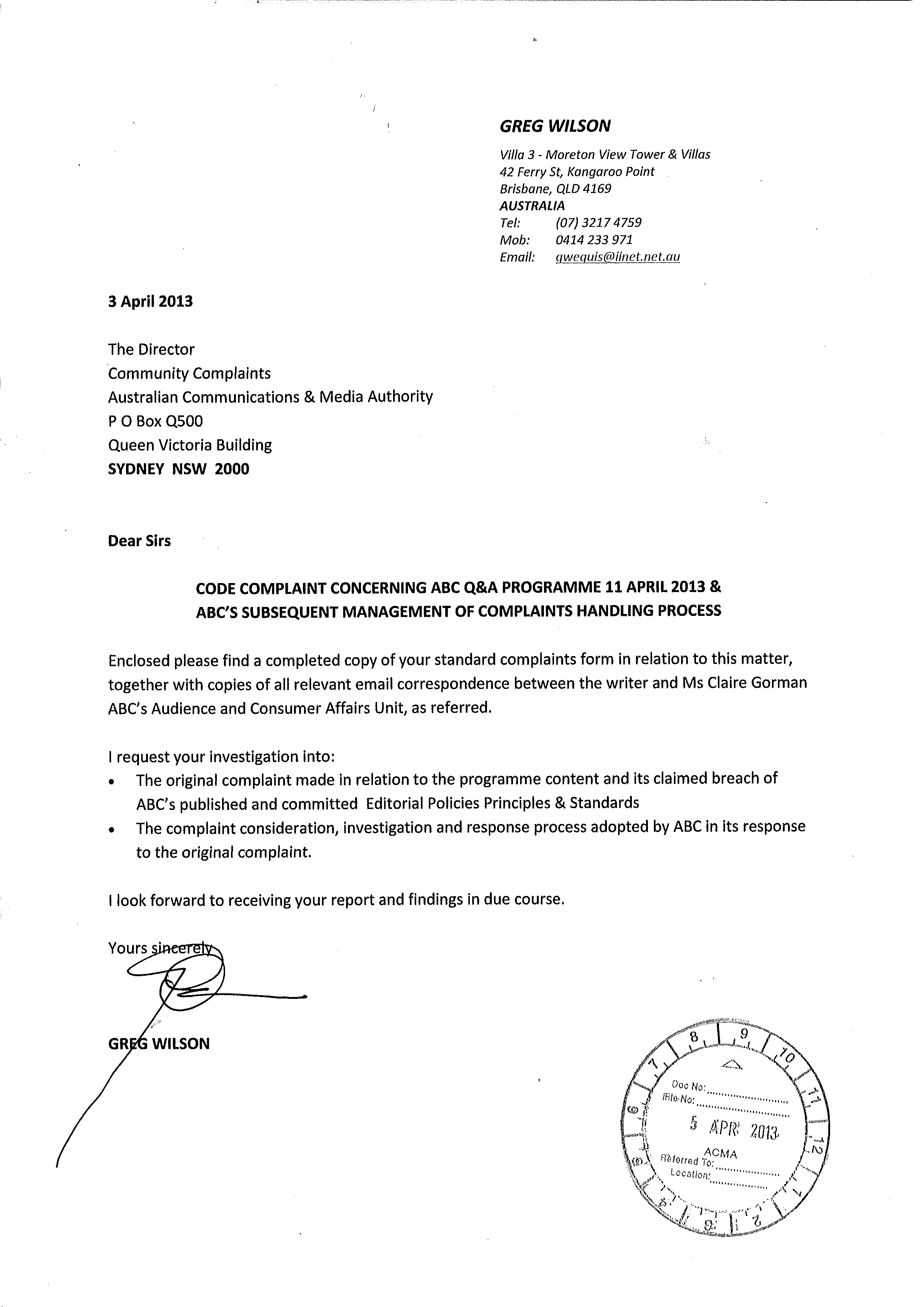 DOCUMENT 5
DOCUMENT 5
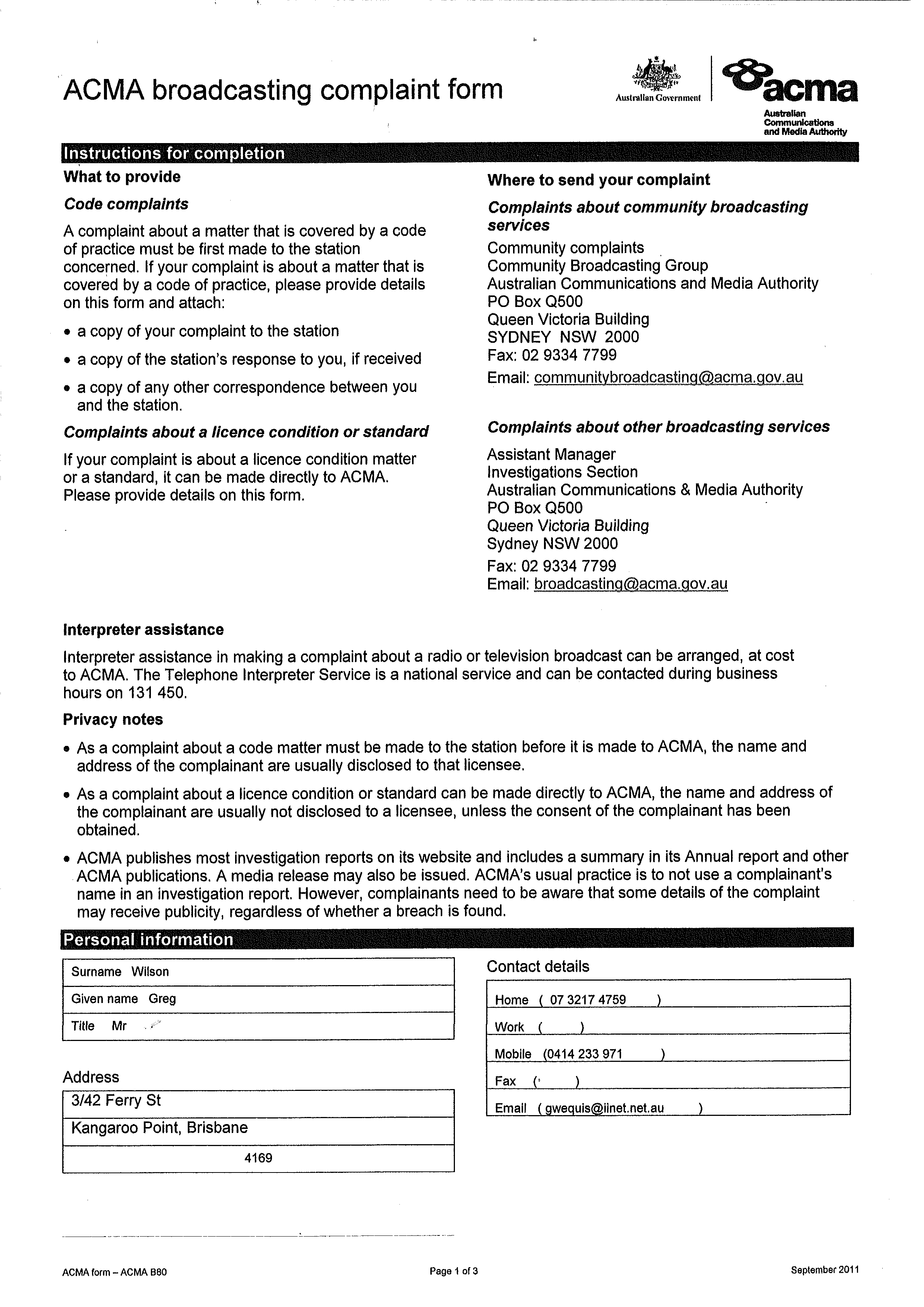
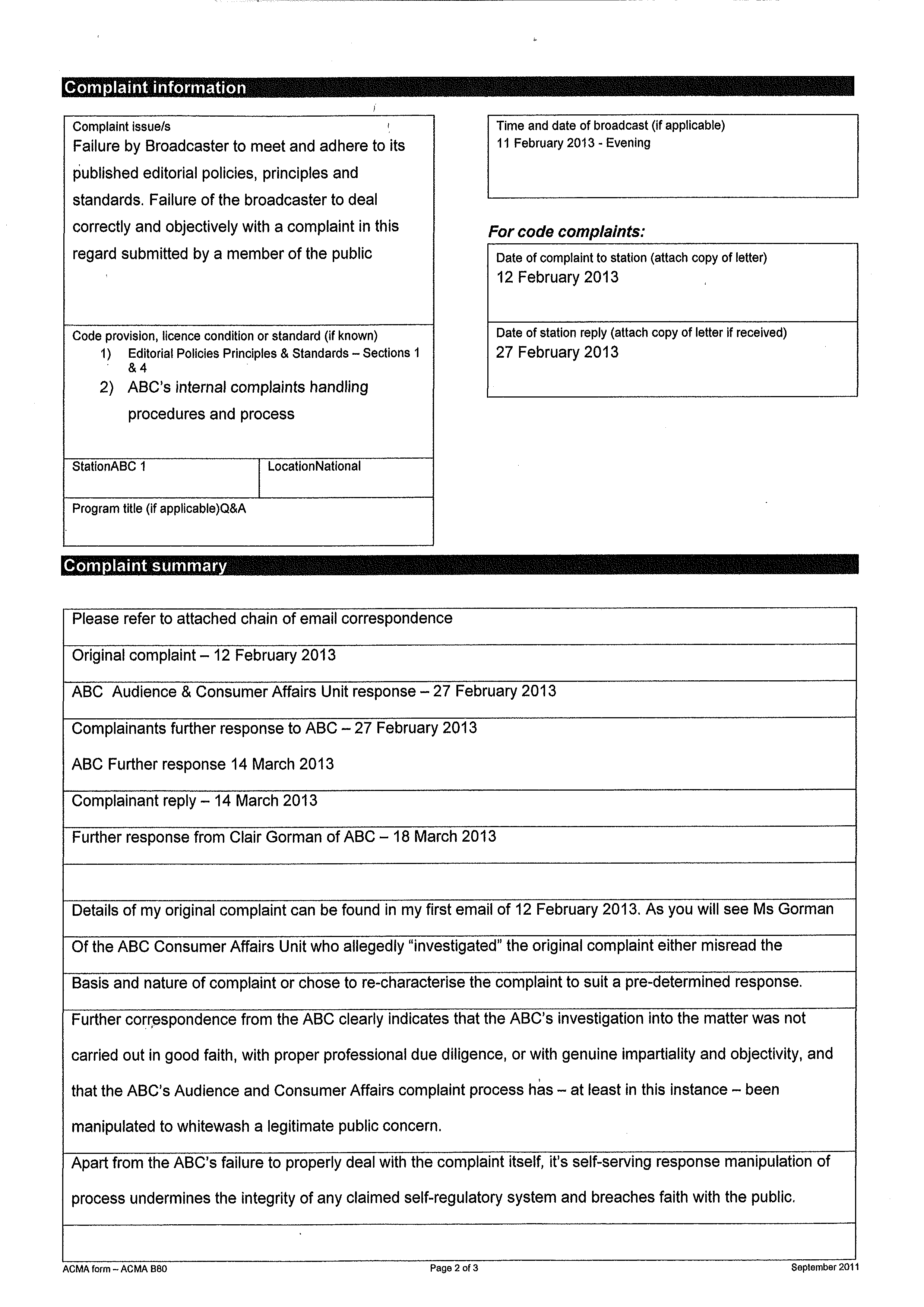
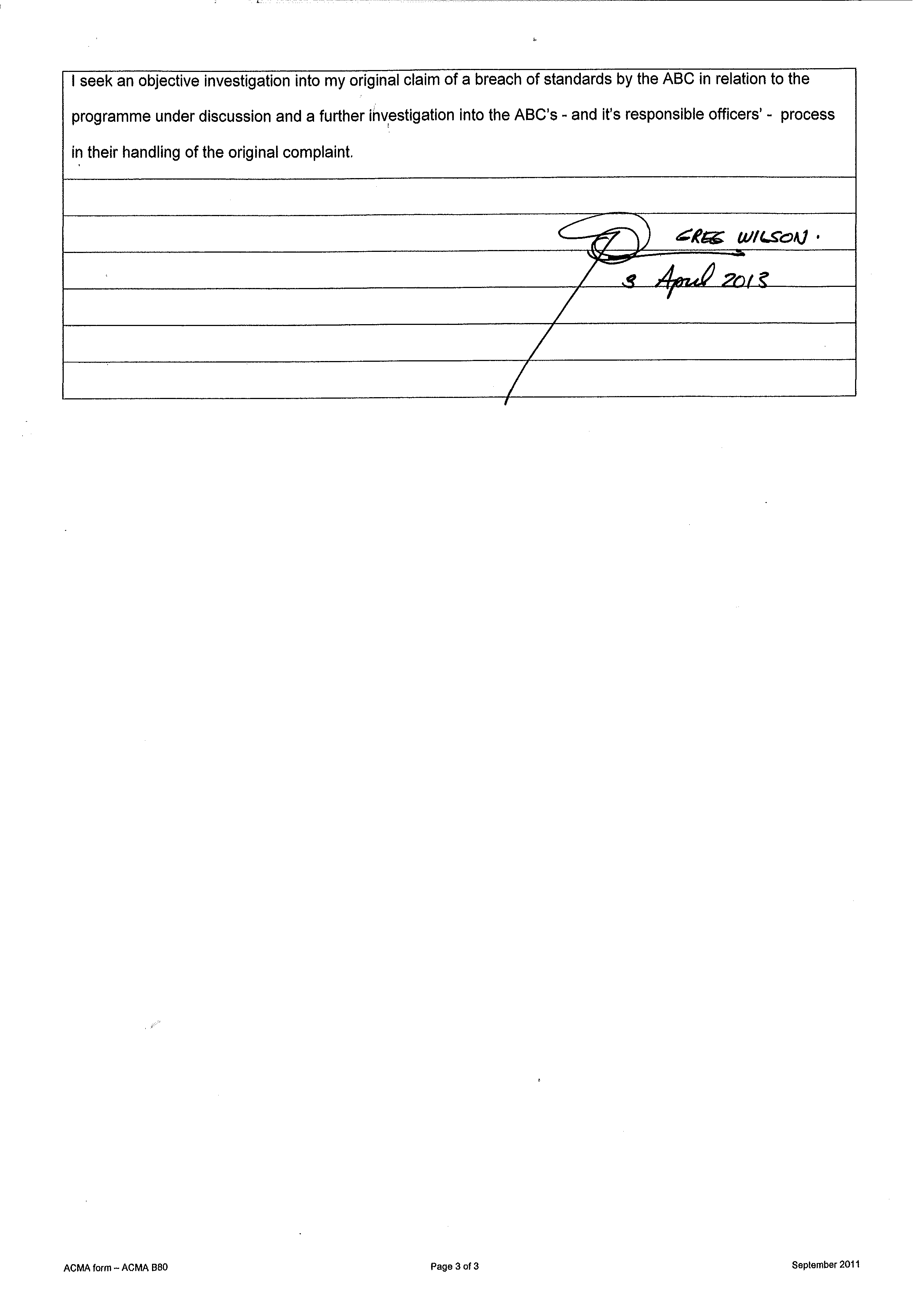
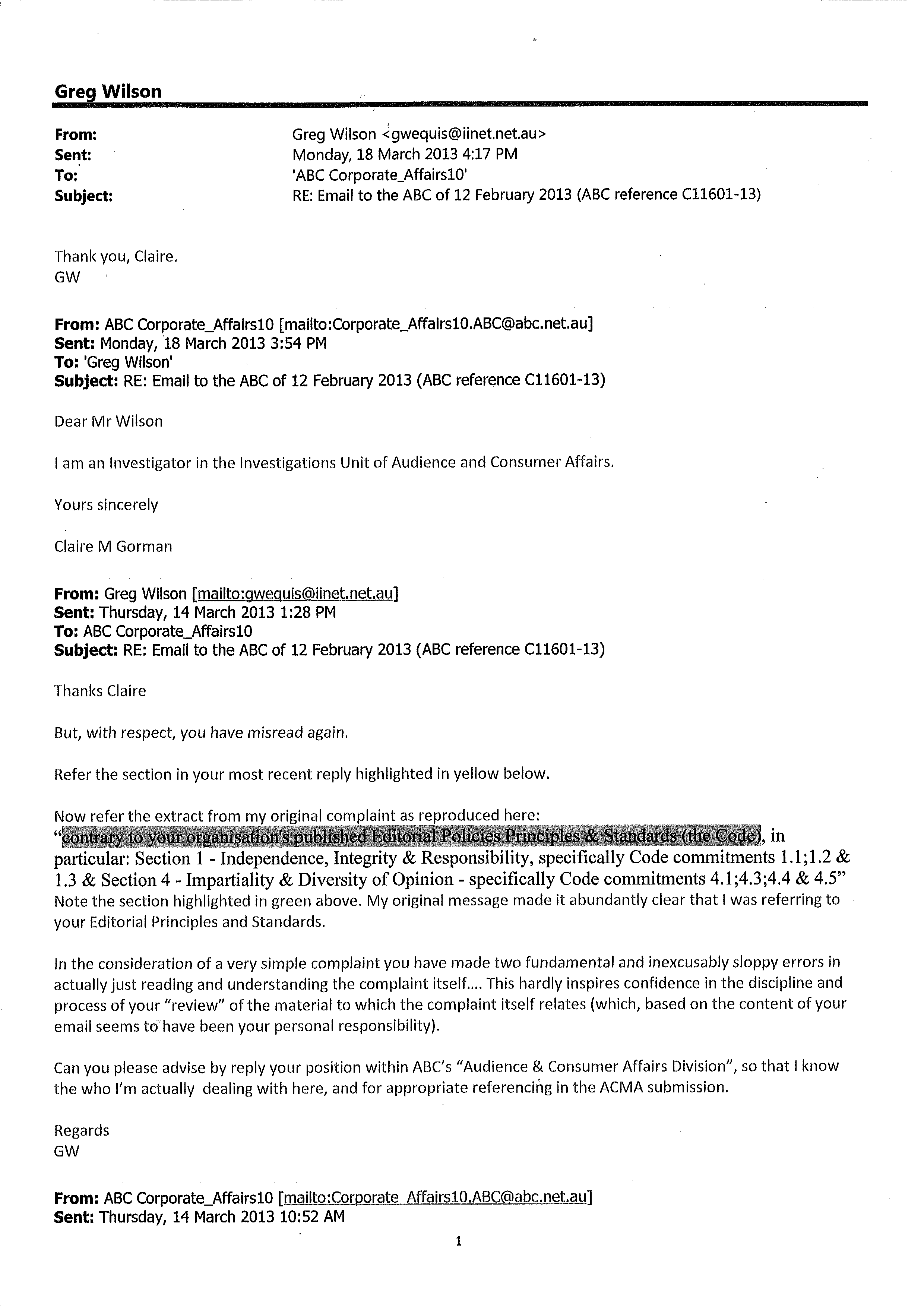
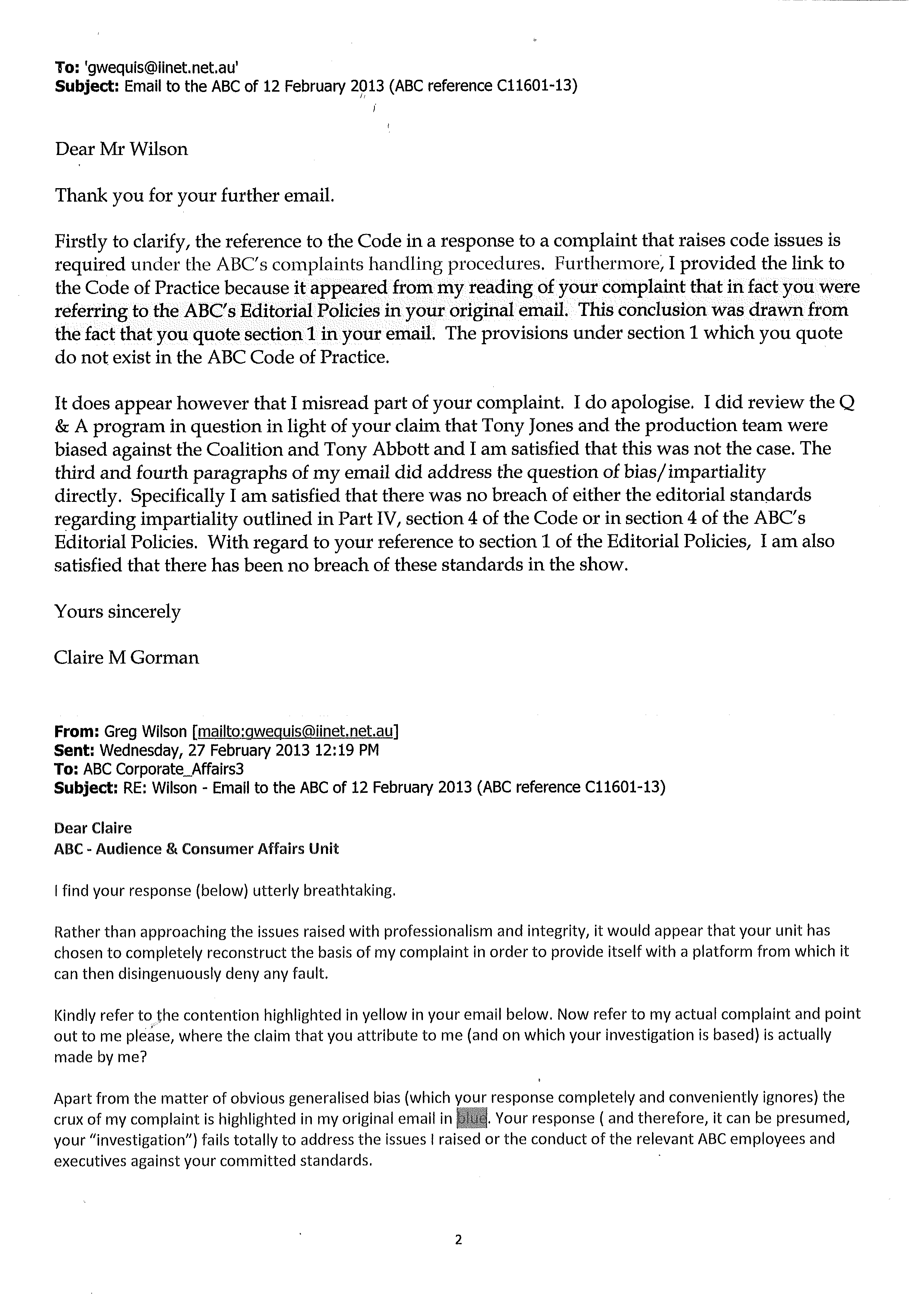
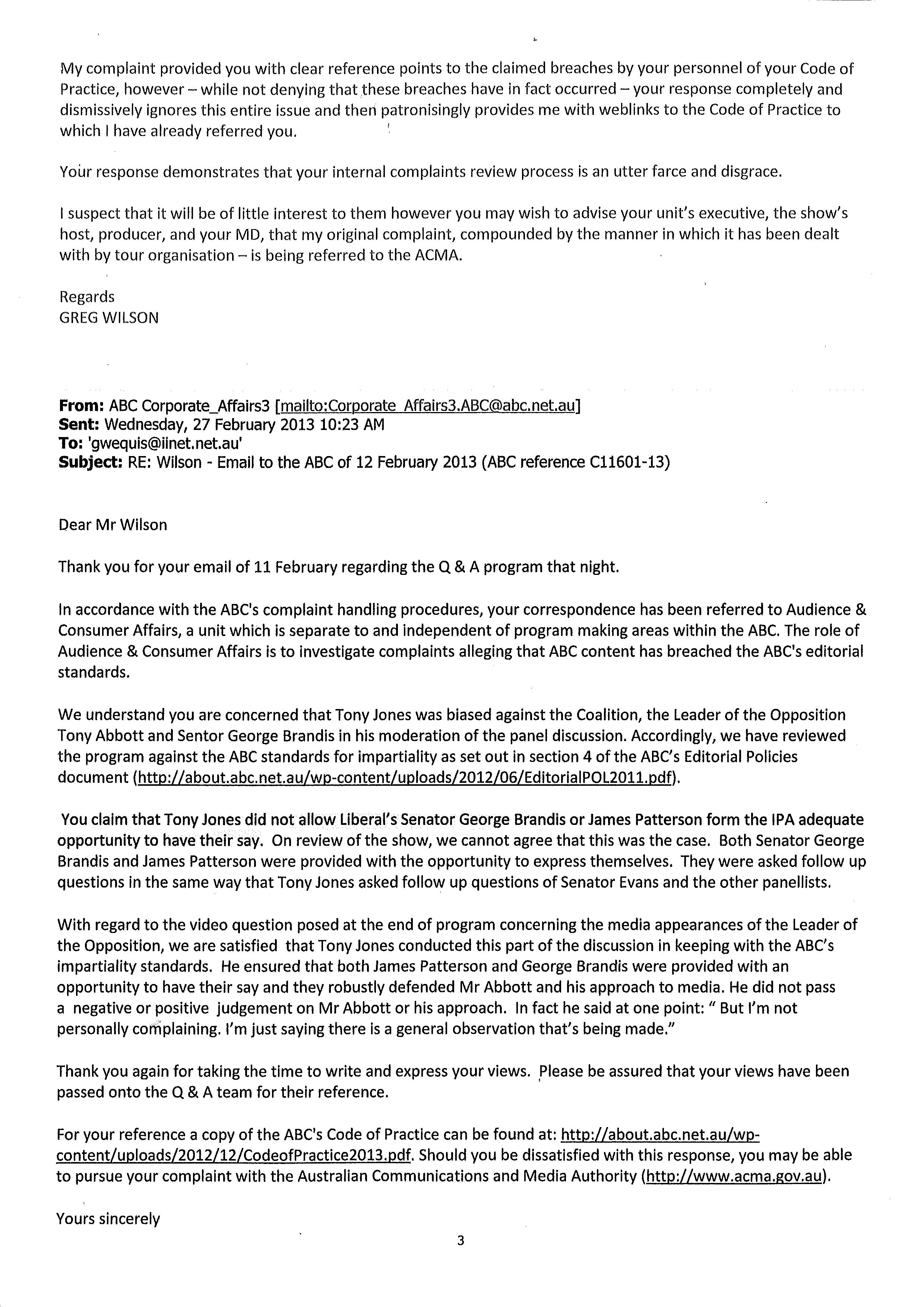
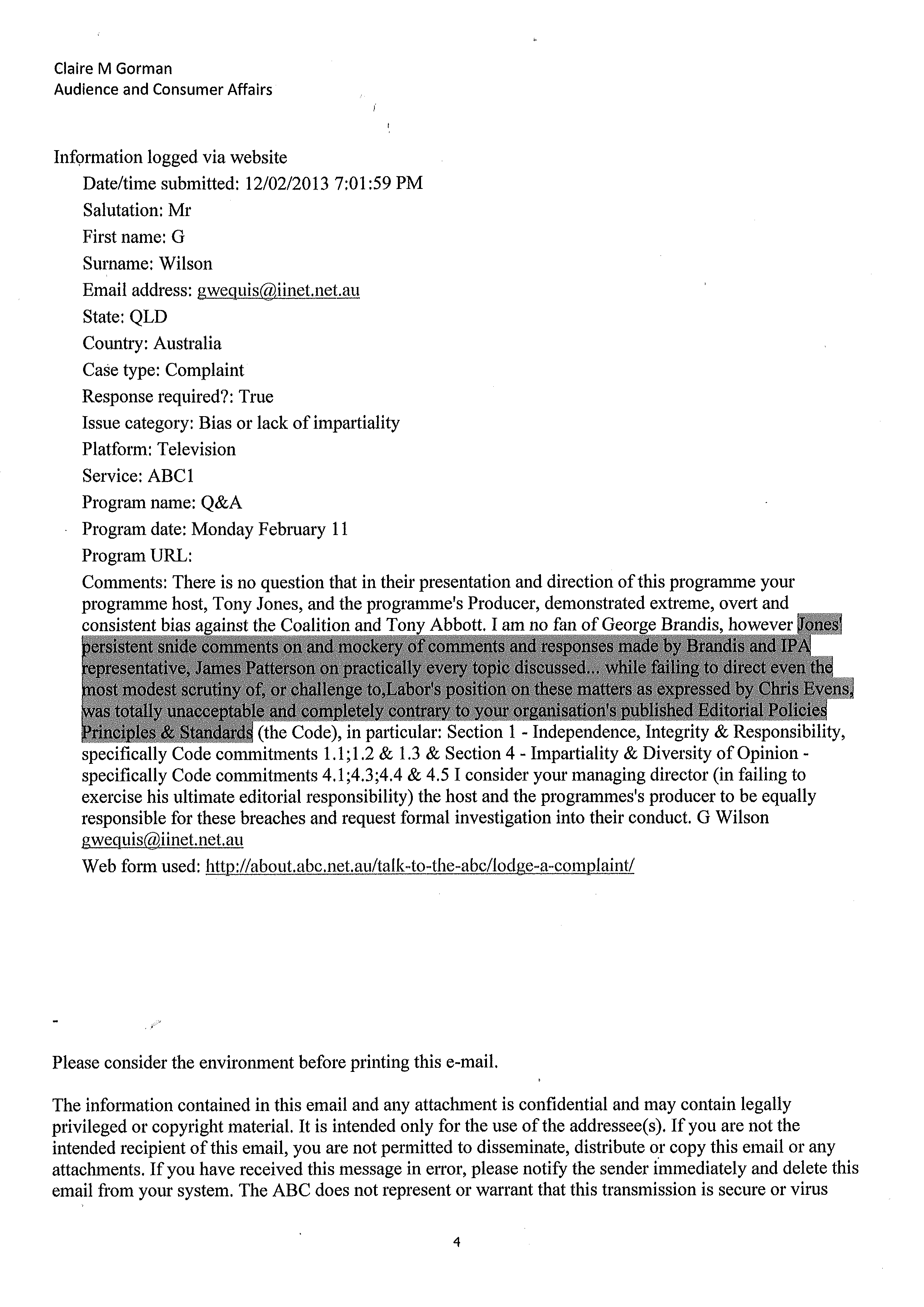
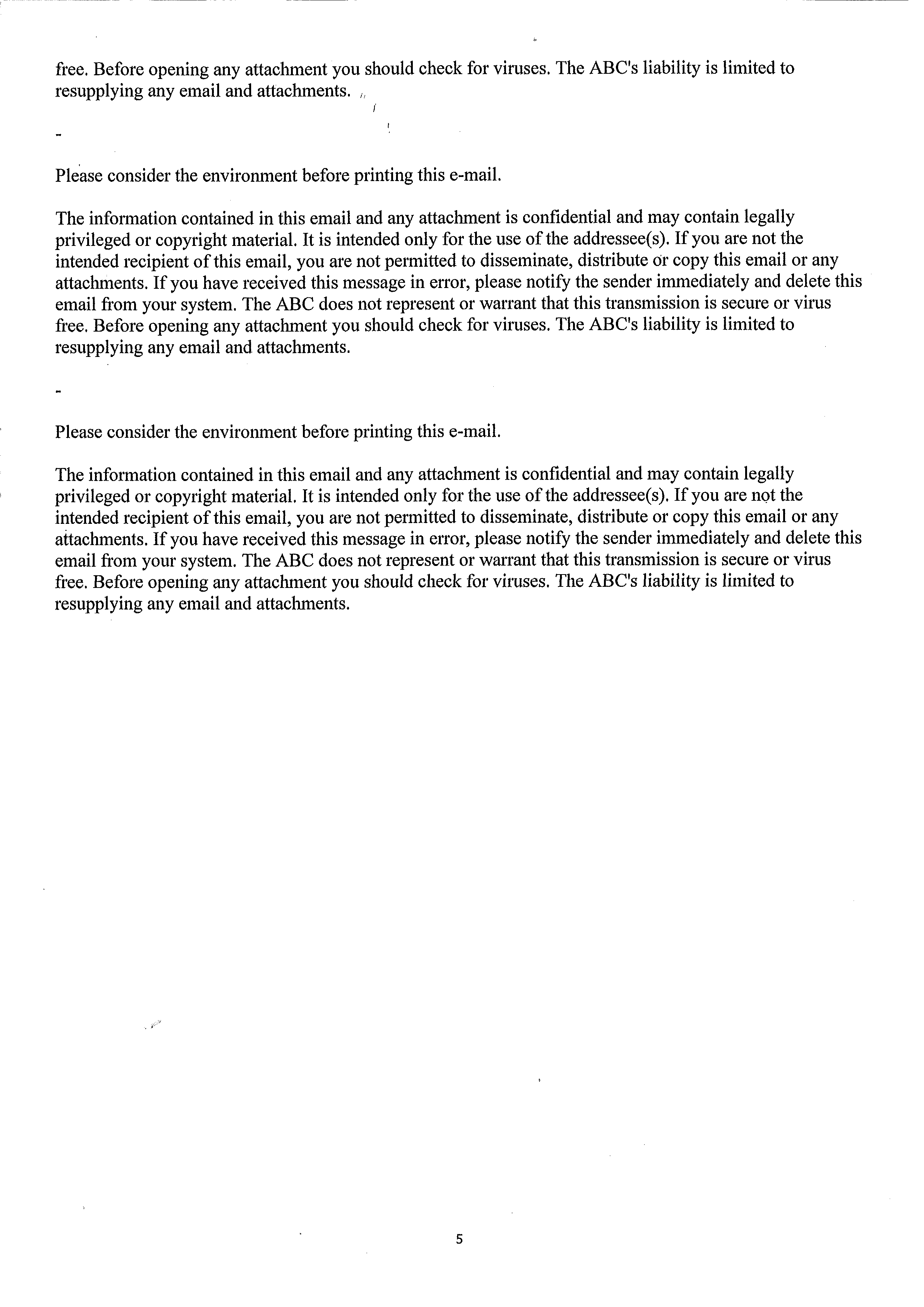
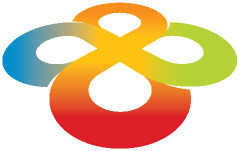
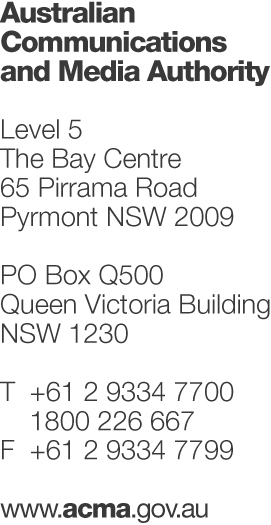 DOCUMENT 6
DOCUMENT 6
9 April 2013
Mr Greg Wilson
Villa 3 – Moreton View Tower & Villas
42 Ferry St, Kangaroo Point
Brisbane QLD 4169
ACMA file reference: ACMA 2013/4-2
C 22306
Dear Mr Wilson
Thank you for your letter, received by the Australian Communications and Media Authority
on 5 April 2013, regarding your concerns about the broadcast of
Q&A on 11 February 2013
on the ABC.
The matters you have raised are under consideration and you will be contacted again in due
course.
Yours sincerely
Broadcasting Investigations Section
Page 1 of 1
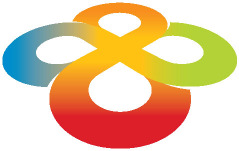
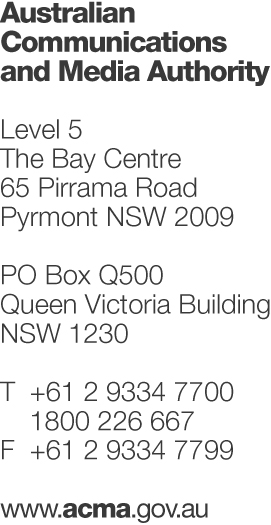 DOCUMENT 7
DOCUMENT 7
12 April 2013
Mr Greg Wilson
Villa 3 – Moreton View Tower & Villas
42 Ferry St
KANGAROO POINT QLD 4169
ACMA file reference: ACMA2013/4-2
C 23306
Dear Mr Wilson
I refer to your complaint to the Australian Communications and Media Authority (the ACMA)
about
Q&A broadcast on ABC TV on 11 February 2013.
Having examined your complaint, I am writing to advise you what the ACMA can and cannot
do in relation to it, and to seek your advice as to whether you would like the ACMA to pursue
the matter in light of this information.
What the ACMA can do
The ACMA can investigate whether the ABC complied with clauses 4.1, 4.3, 4.4 and 4.5 of
the
ABC Code of Practice 2011 (copy enclosed) in the broadcast of concern to you.
What the ACMA cannot do
The ACMA cannot investigate how the ABC handled your complaint. The ACMA can
relevantly only investigate matters covered by the ABC code. The ABC’s complaint
procedures do not form part of the ABC code (see highlighting on the back cover of enclosed
code booklet).
The ACMA cannot investigate whether the ABC complied with section 1 of its Editorial
Standards and Policies. The ABC’s Editorial Standards and Policies is a different instrument
from its code of practice. The code of practice does not contain any requirements that mirror
clauses 1.1, 1.2 and 1.3 of the Editorial Standards and Policies. The ACMA is relevantly only
able to investigate complaints that the ABC has complied with the code.
Advice sought
It is unclear whether you would wish the ACMA to conduct an investigation which would be
limited in scope in the way I have outlined above. Accordingly, your advice on the matter is
sought.
Page 1 of 2
No further action will be taken in relation to your complaint until and unless I receive advice
from you on this.
Yours sincerely
Assistant Manager
Broadcasting Investigations Section
Encl:
ABC Code of Practice 2011
Page 2 of 2
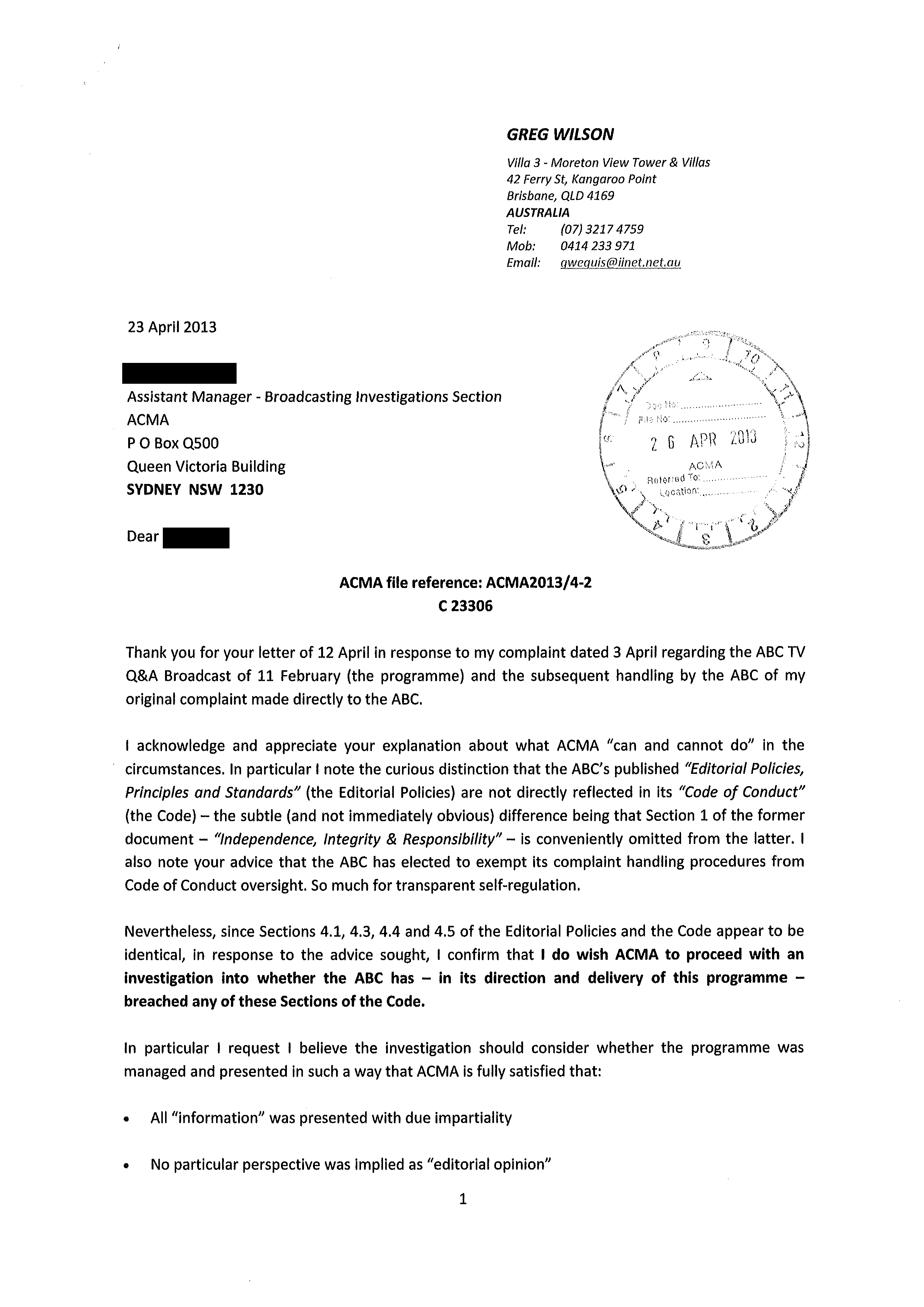 DOCUMENT 8
DOCUMENT 8
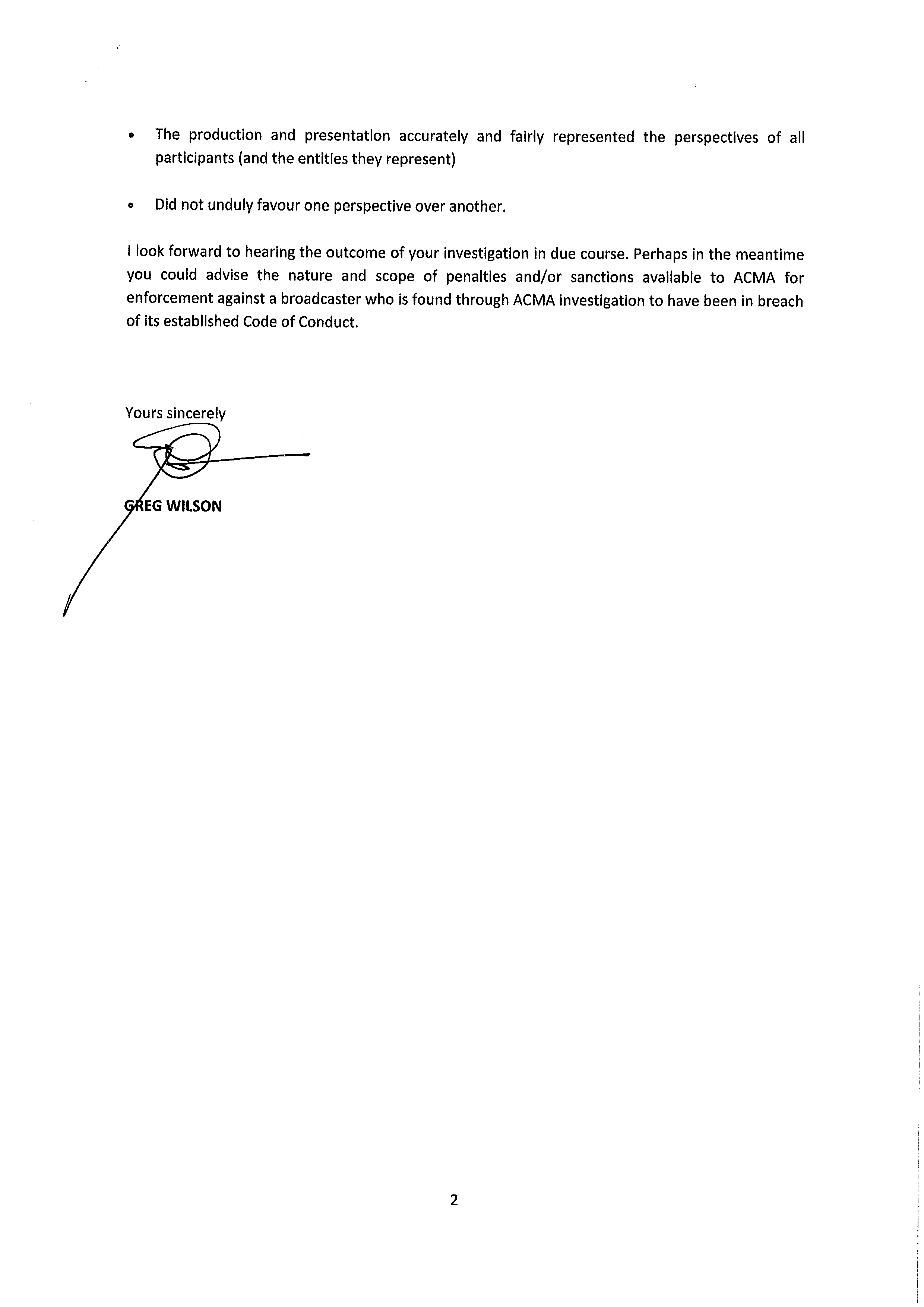
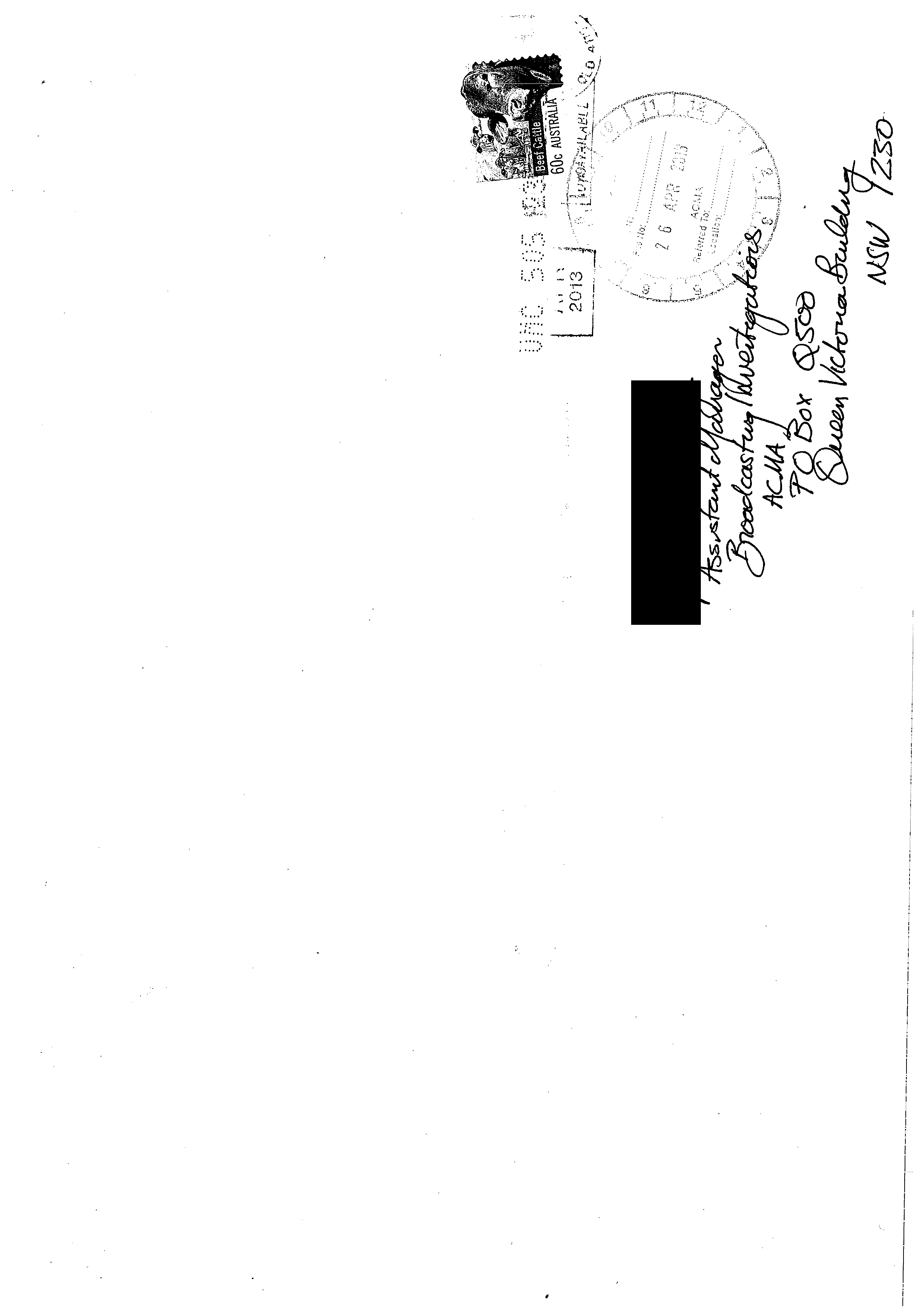
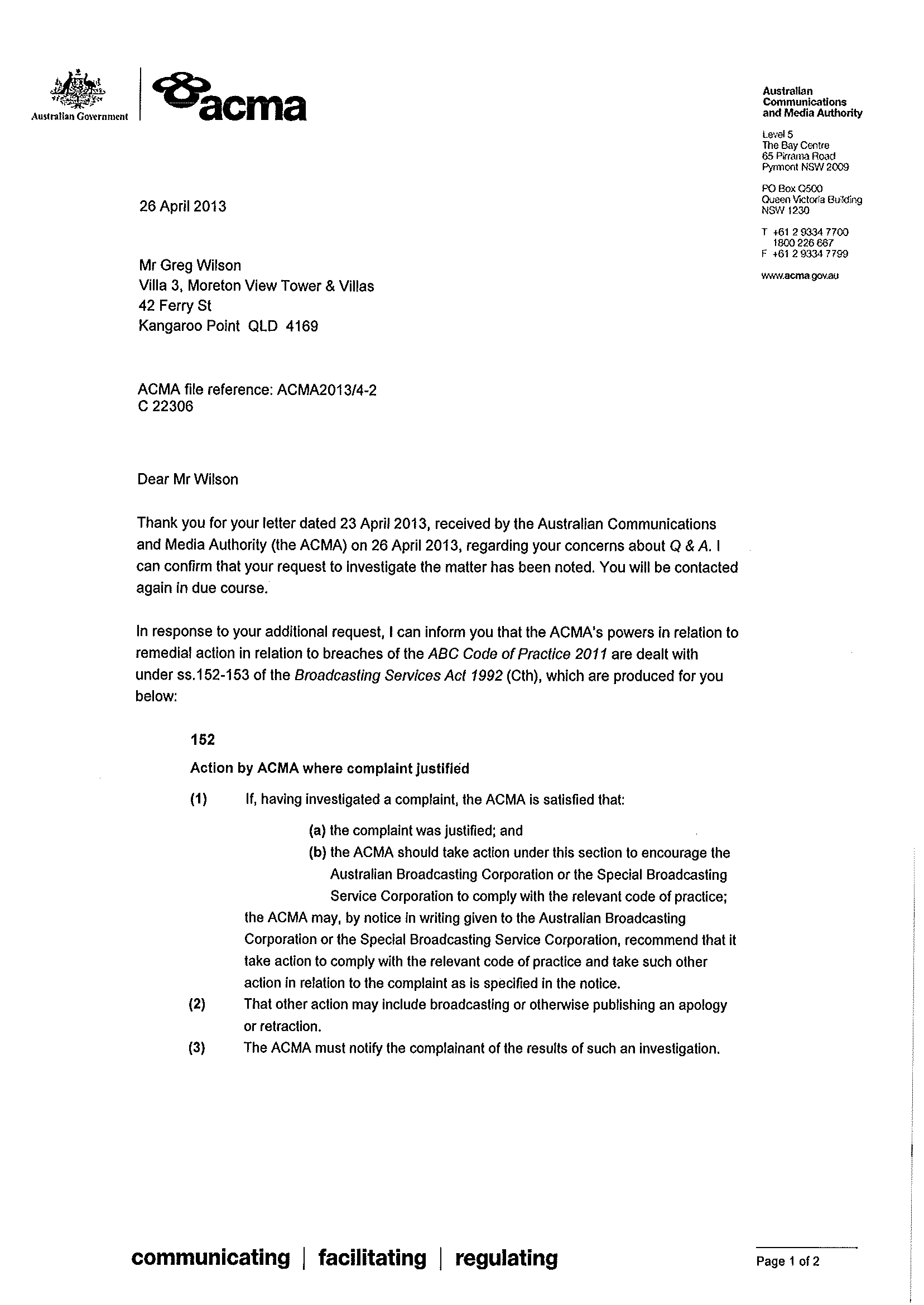 DOCUMENT 9
DOCUMENT 9
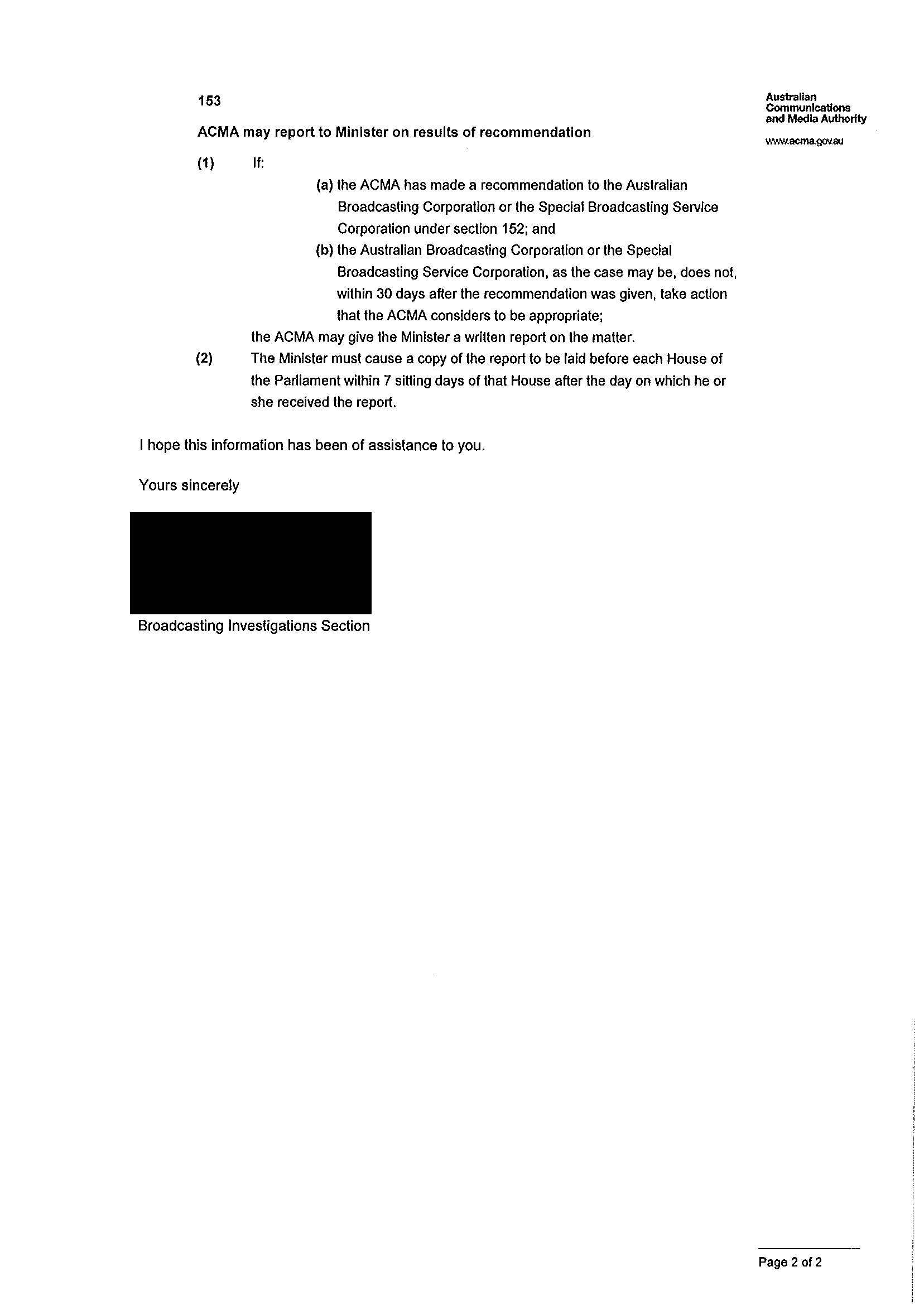
NEW INVESTIGATION BRIEF – Complaint 22306
DOCUMENT 10
Complainant
Mr G Wilson
File No.
ACMA2013/4-2
Broadcaster
Australian Broadcasting Corporation
Station & locality
ABQ - Brisbane
Type of Service
National Broadcaster
Name of Program
Q&A
Date of Broadcast
11/2/13
Substance of Complaint
Bias against the Coalition and Opposition Leader Tony
Abbott.
Relevant Provisions
ABC Code of Practice 2011
Standards:
4.1 Gather and present news and information with due
impartiality
4.3 Do not state or imply that any perspective is the editorial
opinion of the ABC
4.4 Do not misrepresent any perspective
4.5 Do not unduly favour one perspective over another.
Breaches of provision by ABC in None
last year
Current investigation for ABC
11 - See attachment
involving Standard 4 of the ABC
Code
Complaint handling issue?
N/A (2011 ABC Code)
ABC to be asked for/advised:
Copy of broadcast, may seek further later
Complainant to be advised:
Investigation commencing
Comments:
o
The panel discussion apparently dealt with questions about Mining Tax and Labor, Northern Policy
and Tony Abbott’s ability to handle TV interviews.
o
The complainant alleges that the program’s host, Tony Jones, made ‘persistent snide comments on
and mockery of comments and responses’ of some of the panellists, and failed to ‘direct scrutiny of,
or challenge to, Labor’s position on matters...’.
DECISION UNDER SECTION 151 OF THE BSA
Complainant meets section 150 of the
Broadcasting Services Act 1992.
______________________________
_____________________________
CCB EM
Date April 2014
CONSIDERATION LEVEL
CRITERIA FOR DECIDING WHETHER A BROADCASTING INVESTIGATION SHOULD BE
CONSIDERED BY THE AUTHORITY
A broadcasting investigation should be considered by the Authority when:
1.
The subject matter of the complaint is of significant public interest or notoriety; or
2.
The outcome (including any possible sanctions arising) may have material precedent value; or
3.
The outcome from the complaint might raise important policy questions or concerns about the
adequacy of the code.
Also relevant to a decision as to whether a broadcasting investigation should be considered by the
Authority will be whether:
4.
The alleged breach is of a licence condition rather than a code of practice;1 or
1 Noting that some investigations into the alleged breach of a licence condition are relatively routine in
nature e.g. complaints about advertising and sponsorship on community radio.
5.
Within the recent past (say, 12 months), the same licensee, or another licensee within its ‘Network’,
has breached, or the same program has given rise to a breach of, the same licence condition or
same code provisions which are the subject of the complaint.
The initial decision as to whether an investigation needs to be considered by the Authority will be made
by the Executive Manager, Content and Consumer Branch, or the Executive Manager, Citizen &
Community Branch, in consultation with the General Manager, Content, Consumer and Citizen Division,
as required.
This decision should be reviewed if, at any time, it becomes apparent through the investigation that any
of the circumstances in 1, 2 or 3 have been enlivened, or the matter is sufficiently complex and/or high-
profile to suggest consideration by the Authority is otherwise warranted.
NB: At the draft report stage, case officers should review current and recently completed investigations
for the same Network/code provision for actual or likely breaches and present this information to the
clearing officer. This should enable Managers to identify likely ‘cluster’ breaches and revise the
consideration level if necessary.
Delegate (EM/GM): Criterion 1 is met but the complaint appears to be of a relatively routine
nature at the outset. Possible escalation to the ACMA as the investigation progresses if
additional complexities arise.
______________________________
_____________________________
CCB EM
Date April 2013
INV
PROGRAM
COMPLAINANT
STANDARD
2949
Science Show
4.1, 4.3, 4.4, 4.5
3002
Mornings with Jon Faine
4.1
2865
7:30
4.1
2976
Media Watch
4.1
2975
ABC News 24
4.1
3024
ABC News
4.1
2974
7:30
4.1, 4.4, 4.5
2939
7:30
4.1, 4.2, 4.4, 4.5
2972
AM
4.2
3025
ABC News
(
4.5
3032
AM
4.1
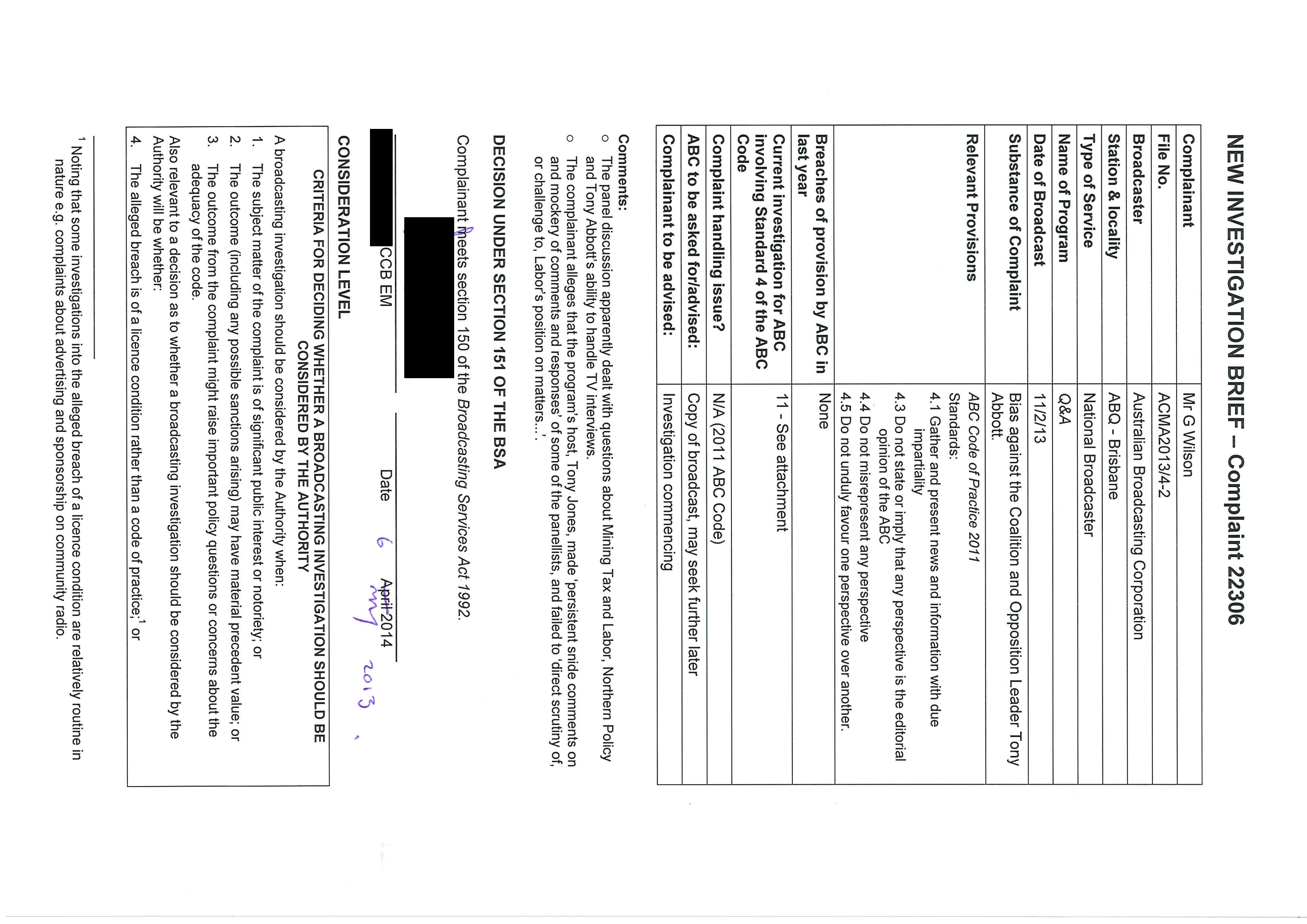 DOCUMENT 11
DOCUMENT 11
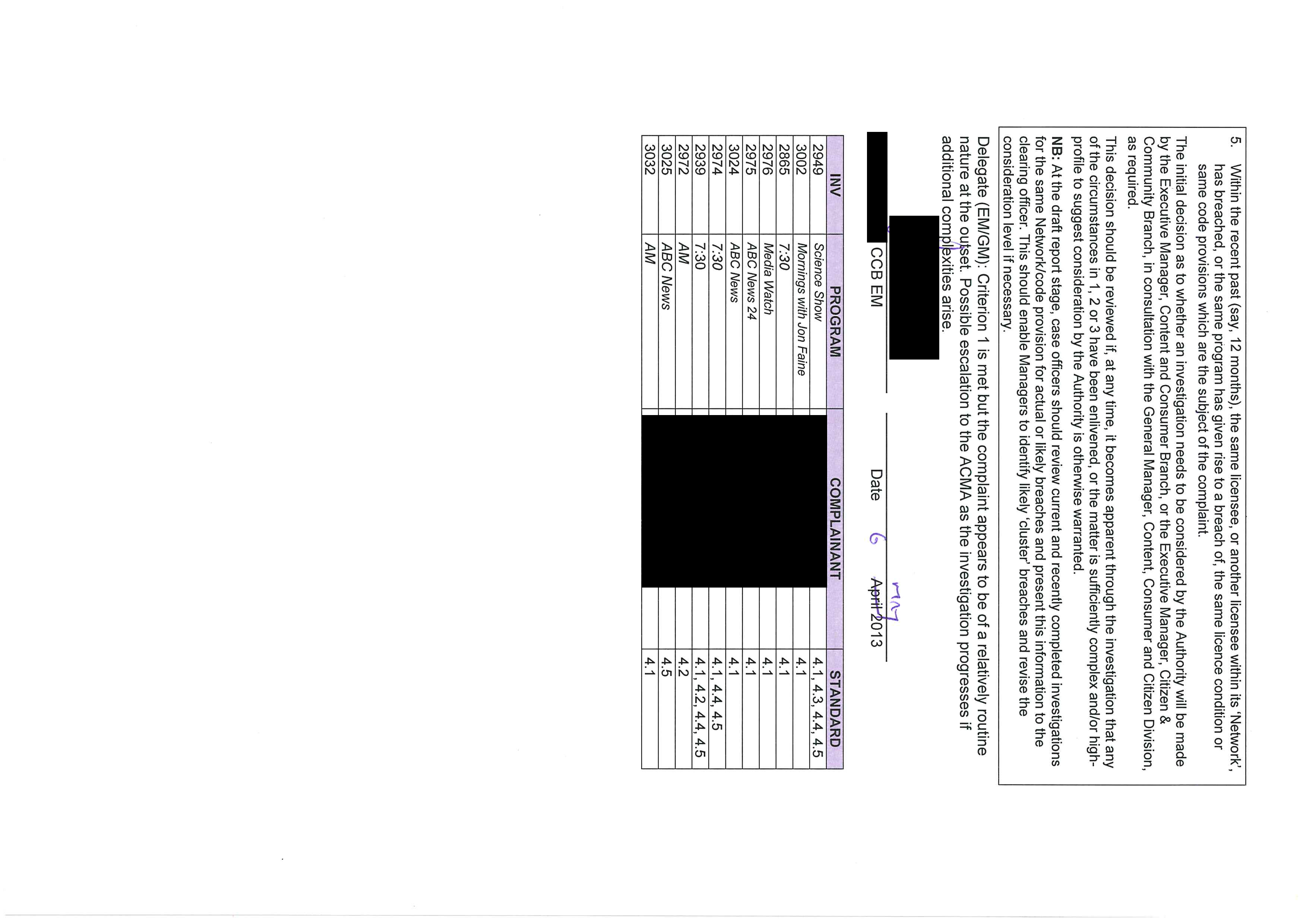
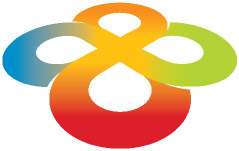
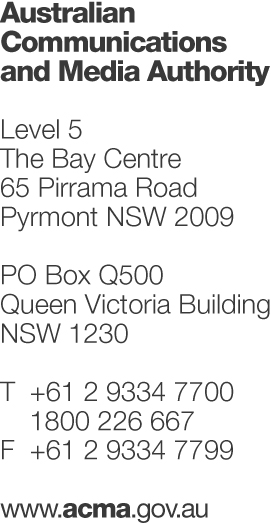 DOCUMENT 12
DOCUMENT 12
9 May 2013
Mr Greg Wilson
Villa 3 – Moreton View Tower & Villas
42 Ferry St, Kangaroo Point
Brisbane QLD 4169
ACMA file reference: ACMA2013/794 Investigation 3042
Dear Mr Wilson
RE: Complaint about Q&A broadcast by ABQ on 11/2/13
I refer to your complaint to the Australian Communications and Media Authority (the ACMA)
concerning the above matter.
The ACMA has decided to investigate your complaint against relevant provisions of the
ABC Code of Practice 2011.
The investigation may take several months, including preparation of a report and internal
clearance.
You will be notified of the results of the investigation when it is finalised.
The ACMA usually publishes final investigation reports on its website and includes an
investigation summary in the ACMA’s Annual Report and other ACMA publications. A media
release may also be issued. Your name and personal information will not be published.
However, you need to be aware that some details of your complaint may receive publicity,
regardless of whether a breach is found.
Yours sincerely
Complaints and Reporting Officer
Broadcasting Investigations Section
Page 1 of 1

 DOCUMENT 13
From:
Sent:
DOCUMENT 13
From:
Sent:
Thursday, 9 May 2013 4:03 PM
To:
'
Subject:
Investigation 3042 [SEC=UNCLASSIFIED]
Attachments:
22306 - Wilson - Complaint.PDF
ACMA reference: ACMA2013/794 Investigation 3042
Dear
RE: Complaint regarding Q&A broadcast by ABQ on 11/2/13
The Australian Communications and Media Authority (the ACMA) has received a written complaint from Mr G Wilson
concerning the above program broadcast by the Australian Broadcasting Corporation. A copy of the complaint
documentation is attached.
Under section 151 of the
Broadcasting Services Act 1992, the ACMA must investigate the complaint if it is about a
matter that is covered by the ABC Code of Practice and the person has not received a response from the ABC within
60 days, or the person has received a response but considers it to be inadequate.
It has been decided to investigate the complaint against relevant provisions of the
ABC Code of Practice 2011.
Accordingly, the ACMA seeks from the ABC a recording of the above-mentioned broadcast. Following a review of the
broadcast material, the ACMA may contact you again to specify the issues to be pursued and to seek your comments
and any additional material.
The ACMA would appreciate receiving the material by
5pm Thursday 16 May 2013.
Please note that giving false or misleading information is a serious offence. This includes information that may be
misleading due to omission.
Please contact me on (02) 9334
should you have any questions, and please address the copy of the broadcast
to my attention.
Please confirm receipt of this email.
Yours sincerely
Complaints and Reporting Officer
Broadcasting Investigations
_____________________________
Australian Communications and Media Authority
T +61 2 9334
F +61 2 9334 7799
E
acma.gov.au
www.
acma.gov.au
1
DOCUMENT 14
ANTIDISCRIMINATION LAWS 14:16
MICHAEL KOZIOL: Yes. Well, Jeremy Fernandez is far from the only one as Senator Evans eluded to.
It’s not actually an uncommon thing in this country to be the victim of an offensive and insulting
attack on public transport. But, George Brandis, you believe that to prosecute such racists under an
antidiscrimination law would be, and I quote, "An outrageous attack on our fundamental freedoms".
Why?
GEORGE BRANDIS: Well, first of all, what we're talking about is an incident that involved more than
the expression of racial abuse. There is the world of difference between somebody expressing an
opinion that others might find offensive and somebody creating a scene in which people feel
threatened and their children feel intimidated or they feel worried about the wellbeing of their
children. So that’s the first point. But I don't for a moment abate from my view that it’s not the role
of Government to impose prohibitions on what people in a peaceful and orderly way are allowed to
say and think. Even, you know, the test of a free society is whether you're free to say things that
other people find offensive or insulting. That is the test. You can't say we live in a free society
because I am at liberty to say something so innocuous that other people will agree with it. The test
of a free society is whether you're allowed to say unpopular things.
TONY JONES: Are you, under your imagining of this, are you allowed to should you be allowed to,
without any prosecution, racially abuse someone openly in public, to their face, while their child is
sitting there? Should that not be an offence?
GEORGE BRANDIS: Well, I think that goes way beyond the expression of an opinion. That constitutes
intimidation or, in certain circumstances, assault, which has always been against the law.
TONY JONES: So let's just go back over this because you do want to see major changes to the
Antidiscrimination Act as it now stands, even though the Government is in the process of renovating
it or changing it significantly. There are sections of it, including the clause which caught up Andrew
Bolt, which you want to change if you come to Government. Is that right?
GEORGE BRANDIS: That’s right. That’s right. And, in fact, it’s the infamous section 18C which, in a
sense, as a result of bad drafting, runs together the two quite separate things that the gentleman
adverted to in his question. What it criminalises or prohibits, at least, is conduct that may cause
offence, insult, humiliation or intimidation. Now, the Liberal Party has never said that conduct that
intimidates in the sense of threatens people ought not to be against the law. It always has been,
going back to the dim dark reaches of the criminal law centuries ago. But the expression of an
opinion that merely offends somebody else or insults somebody else is, in my view...
TONY JONES: Humiliate.
GEORGE BRANDIS: ...none of the law's business.
TONY JONES: So, I mean, insult, humiliate and, what is it, offend, those things should be okay?
GEORGE BRANDIS: The point at which you draw the line is whether it is the expression of an opinion,
regardless of how provocative or unpopular it might be to the ears of others or even a majority, and
conduct which is invasive of somebody else's rights because it threatens or intimidates them. That is
where I draw the line.
TONY JONES: Corinne, what do you think?
CORINNE GRANT: Well, hasn't Nicola Roxon already flagged that the offensive bit, the bit you find
offensive, the bit about offence, is already going to be taken out of that?
GEORGE BRANDIS: No. No, she hasn’t.
CORINNE GRANT: I’m sure she has, hasn’t she?
GEORGE BRANDIS: What she, in fact, said...
TONY JONES: She's changing one section of it is but there still will exist clause 51 or some version of
clause 51.
GEORGE BRANDIS: That’s right.
TONY JONES: Which will actually include the same sort of - the same things that he just said will be in
the Act in future.
CORINNE GRANT: Right. I think there’s sort of two ways of looking at it as well. You say, like, a free
society should be able to do whatever it likes but, at the same time, a free society gets to decide
what rules it wants to be applied to its country. That is how a democracy works. And this bill has
been - this draft bill has been out for a long time. There have been hundreds of submissions, which is
an indication, I think, that democracy is working and I don't think there are too many people in this
country who really do want to see people using their freedom of speech to intimidate and harass
other people to the point that they don't get to enjoy the same rights as the rest of us.
GEORGE BRANDIS: But I’m not disagreeing with that proposition. In fact, what you’ve said, Corinne -
what you’ve said in slightly different words is the very thing I said, that is the law should draw the
line at conduct which intimidates or harasses on the one hand and conduct which is merely the
expression of an unpopular opinion, which should not be the business of the law.
TONY JONES: Well, let’s go to Chris Evans because, well, it is your government that’s keeping,
essentially, this clause, so should conduct which is reasonably likely to offend, insult, humiliate or -
we’ll leave out intimidate because it sounds like there is agreement on that word - offend, insult or
humiliate. Should that be legal?
CHRIS EVANS: Well, I think, first of all, this was - a draft put out for discussion and the Government's
listening to those views and this one has turned out to be more controversial than was anticipated. I
think from the Government's point of view, we thought other things would be more controversial
than this because we're effectively bringing current Acts together to try and get a better regime in
place. But I think I fall I mean, this is about where you draw the line. I suspect I draw it a bit before
George, in the sense that I think where people seek to racially abuse people, seek to harass them,
then I think it is reasonable, in a civil society, for people to be protected from that. Now, it’s always
about where you draw that line but I don't think I would be as Liberal as George Brandis is and I
don't think our view is that we ought to be that Liberal. We had this debate about racial hatred back
in the mid ‘90s, the incitement of racial hatred and we take the view that those are - that people
have a right to be protected from that sort of activity.
GEORGE BRANDIS: But you know, Chris, this is an - if I may, this raises a deep issue. Just because
something is bad, racism in my view is always bad, a bad thing, should the Government always
parcel law to deal with it or should society deal with it other than through legislation and regulation?
TONY JONES: Okay. We’ll leave that as a rhetorical question. I want to hear from our other panellists
and let’s go to James.
JAMES PATERSON: Tony, I think it’s worth pointing out that what happened to Jeremy Fernandez on
that bus is covered by a myriad of other laws, for example harassment laws at the state level. Clearly
he was the subject of harassment and that would have covered that. It’s illegal to swear on a public
bus so that would have covered it. There are a lot of ways of addressing this without any new
Federal legislation on anti discrimination. But this federal anti-discrimination legislation, which the
Government is currently exploring, has a lot of perverse things in it. For example, it reverses the
onus of proof. So under the current law if I allege that, for example, the ABC has discriminated
against me, it is up to me to prove that you’ve discriminated against me. But under the new draft,
the onus is reversed and all I have to do is make a basic prima facie case to get it into the court and
the it’s up to you to defend yourselves and prove that you didn't discriminate against me. Now,
that’s an extraordinary thing. That’s undermining the presumption of innocence, which is a
fundamental legal principle that we’ve had for many years in Australia. But it’s even more
extraordinary when if you offend me on the basis of my political opinion that will be unlawful. So if I
think that you didn't give me sufficient air time tonight, Tony, and I was offended on that basis, the
ABC would have to defend an antidiscrimination claim against me under these new laws.
CORINNE GRANT: Well, no, because the judge could actually throw that out for being vexatious.
JAMES PATERSON: That doesn’t mean they don't have to defend it in court. That doesn’t mean they
don’t have to engage lawyers to defend themselves. I shouldn't be able to make a claim like that.
That’s clearly (indistinct)...
TONY JONES: It is a draft bill, as we’ve said earlier.
CORINNE GRANT: Yeah.
TONY JONES: Let's quickly go to Chris Evans. Do you think that reversal of the onus of proof, which is
obviously proving to be very controversial, do you think that will change?
CHRIS EVANS: Well, look, I think this is a draft that’s out for discussion, feedback, submissions, a
Senate inquiry process. This is the debate we're having as to where we finalise where the Parliament
finally lands. So I think that’s a good and healthy thing. But I say the major focus of this is actually
bringing current legislation together. I think there are some conspiracy theories...
JAMES PATERSON: Well, that’s not true at all.
MULTIPLE SPEAKERS TALK AT ONCE
CHRIS EVANS: Well, there’s arguments about some of it going further. I concede that. But I think
there’s some conspiracy theories...
GEORGE BRANDIS: Well, that’s been conceded on your behalf.
CHRIS EVANS: Well, I think there are some conspiracy theories also taking hold here that aren't
warranted. But the process is in place. I think we’ll end up with a good piece of legislation and the
parliament will go through that process. But, as I say, most of it’s about trying to bring the current
pieces of legislation together.
TONY JONES: All right. There are other questions on this general subject. We’ve got one from Daniel
Iachini.
RACISM AND THE MEDIA 23:07
DANIEL IACHINI: The saturation of online social media, such as Facebook, Twitter and YouTube, are
now giving us insight into racist behaviour which would have previously remained hidden from
public view. There is an alarming growth of racist Facebook groups, tiled “F-off, we’re full,” and the
like and a growing number of YouTube videos now show people caught on camera racially abusing
others. Do you think social media exacerbates racism or can we use it as a tool to assist in defeating
it?
TONY JONES: Rachel, what do you think?
RACHEL BOTSMAN: Yeah. I think it goes back to the most common question that’s asked around
social media, which is: is it a tool for good or for evil? You have to sort of - if you think of what social
media does, it gives us access to information, it gives us access to conversations. But it’s also going
to change the types of conversations that are out there. So for every good conversation there’s
going to be a dark side. I personally believe that the debate is a good one to have. I think Jeremy was
incredibly brave at how public he was around social media. So I think it’s - you can't say let's control
social media because you're actually trying to fight against the DNA of what social media is about. It
is an open system that’s designed to go viral. So trying to put it back in the box is kind of an obsolete
conversation to have.
TONY JONES: Corinne, what do you think? I mean, if you're going to try and put certain things in a
box, that means you can't insult people, you can’t humiliate them, can you do that on social media
or not, do you think?
CORINNE GRANT: Well, the UK has tried to do that a bit and it’s not working out so well for them. I
mean but that’s a separate that’s under the Communications Act I think that they're doing that, not
under the Discrimination Act. I think that I am not sure that Facebook and Twitter is changing the
level of racism. I think it’s I don't think that if you're a person who is not particularly racist that
somehow Facebook has turned you into a racist. At least I hope not. But I think it’s found a place for
those people to meet and form a group. But at the same time, like Rachel said, it has found a way for
those who are more Liberal in their way of thinking to form groups as well. I think what needs to
happen for any kind of educative process to happen is for the people who believe that racism is
wrong, such as myself, need to take the heat out of their argument, need to not abuse people back.
They need to find ways of being more educative in the process and to come to it with good heart
and try and find a way to communicate with these people effectively.
TONY JONES: I’ll hear from the other non-politician first. James, what do you think?
JAMES PATERSON: Yeah, Tony. I think we need to be extremely cautious when we're talking about
regulation or legislation in this area. We’ve seen elsewhere in the world, particularly in the United
Kingdom, 17 year olds being jailed for sending a silly Tweet, which they regret. We don't want to see
young people making a silly mistake online and paying for it with serious jail time and that’s the kind
of thing that these laws lead to. Police agents - police are completely diverted to chasing up silly
online disputes and that is not something I think we want to see in a free country like Australia.
TONY JONES: Chris Evans?
CHRIS EVANS: Well, I think that the reality is that even if you wanted to, controlling social media is
probably beyond regulation in many ways. It’s certainly beyond very effective regulation.
TONY JONES: But just put it this way: if your laws, you know, writ broadly as they are, the
Antidiscrimination Act, comes into effect, could it actually impinge on people's freedom to say things
on social media? Could you find the same thing as happening in the United Kingdom, you people -
stupid young people - getting arrested for doing or saying stupid things?
CHRIS EVANS: Well, I think it’s more about whether or not people are trying to incite something like
racial hatred rather than saying stupid things. But I think the reality is all governments are struggling
to come to terms with social media and what it means more broadly for our society. But I don't think
us trying to sort of intervene heavily is the answer. It is about people sharing their views and I think
Corinne's point is the key one, you want to try and help people develop more positive views rather
than think that somehow by clamping down on their use of social media, one is able to somehow
solve the problem. I think the reality is Governments are struggling to keep up with the rate of
technological change and the way the world is moving and I am not sure there are easy answers.
RACHEL BOTSMAN: But to be honest, I don't think our politicians are trying hard enough. I mean
there was a study that was released last year that showed that a third of all our government leaders
are social media virgins. They have no social media accounts whatsoever. A third of ...
CHRIS EVANS: You're deliberately trying to embarrass me here, aren't you?
RACHEL BOTSMAN: I won't embarrass you. I know you have a Twitter account. I don't think that is
you tweeting by the way which is...
CHRIS EVANS: Absolutely, absolutely not.
CORINNE GRANT: Is it full of YouTube video of cats, is that why?
RACHEL BOTSMAN: No, it’s pretty boring. I could give you some advice actually.
CHRIS EVANS: I am very glad to hear that.
RACHEL BOTSMAN: Yes. Follow the Mayor of Newark. He’s pretty good actually, Cory Booker. The
interesting thing so a third are completely inactive, a third are like you, where they have an account,
because I am sure some young person said this is what you should do and then a third are...
TONY JONES: The other third are Malcolm Turnbull and Kevin Rudd.
CORINNE GRANT: Exactly.
RACHEL BOTSMAN: Yeah. Who actually have more combined than the whole political party, which is
very interesting. So do we really trust these people who don't innately use these tools to be our
internet policemen? They shouldn't be our digital guardians. They shouldn’t be selling regulations
around...
GEORGE BRANDIS: Well, why should we have policemen and guardians though, I mean? I think that’s
the problem and if I can, Tony, return to the question that was asked of us, I don’t think it is - I don't
think that to throw a spotlight on a problem is to exacerbate the problem. You asked, sir, whether
social media make the problem of racism worse. No, I don't think so because when you throw a
spotlight on unattractive or unacceptable conduct that most people would find shocking, then more
people will come to learn of that and the capacity of society spontaneously to join together and say,
well, you know, that’s not the way we Australians behave, I think will be enhanced and that’s a much
better way of exposing obnoxious opinions than by heavy-handed Government regulation or
legislation.
TONY JONES: Okay. Let’s move along. Our next question is a very different one tonight. It comes
from Carolyn Zietsch.
MINING TAX AND LABOUR 29:04
CAROLYN ZIETSCH: My question is mostly directed at Senator Evans. I have been a Labor Party voter
since I was 21 and that’s a long time ago. I would like to ask how can the present Labor leaders
destroy the party of the true believers by having watered down the mining tax to such an extent that
it raised such a paltry sum of money? Why do they continue to pander to the interests of such a
wealthy minority? Will they bring back the tax as it was envisaged under Rudd?
TONY JONES: Chris Evans?
CHRIS EVANS: Well, I mean, it’s interesting. We were attacked for bringing in a tax that was going to
destroy the mining industry. Then we were attacked now for it hasn't raised enough money. But I
think the response in the crowd indicates that public sentiment has come to support the mining tax
because the principle is that companies who are making super profits get to share some of that
wealth with the Australian public. It is a profit based tax.
CAROLYN ZIETSCH: I think the grass roots Labor people always did...
TONY JONES: Sorry. Hang on. We’ll get a microphone over to you. Go ahead.
CAROLYN ZIETSCH: I think the grass roots Labor people always supported it and didn't appreciate it
being watered down.
CHRIS EVANS: Yes, but it is also true, as a West Australian politician, I can tell you it was pretty tough
arguing the case for the mining tax in Western Australia.
TONY JONES: It’s not so tough arguing the case for one that doesn't raise any money I suppose.
CHRIS EVANS: No. No. No. Well, I think it’s fair to say we won that argument. We won that
argument.
GEORGE BRANDIS: Why, by not raising any revenue?
CHRIS EVANS: I think, no, apart - no, apart from - well, you thought earlier, your rhetoric was we
were going to destroy the country by putting the tax on. We put the tax in place, then Liberal State
Governments increased their royalties to try and undermine it in that way. But the reality is it’s a
sensible tax. It is based on the same principles as apply in the petroleum industry, that’s served us
well. It is profit base so it will be volatile and it will go up and down depending on the profits being
made by those companies but fundamentally it’s a good tax.
TONY JONES: You’ve sort of put your finger on one of the things, there’s a key criticism of the tax as
it is currently written and that is that Liberals State Governments, they are in fact Liberals, as it turns
out, or Liberal National Party governments, can actually raise royalties and the Federal Government
has to cover that with the mining companies, therefore you don't raise any money?
CHRIS EVANS: Yeah. No, look it is a problem.
TONY JONES: Should that be fixed?
CHRIS EVANS: Well, it’s got to be fixed in my view and I think there’s a process now with the States
where we are looking to meet in March to try and resolve that because the reality is State
Governments State Liberal Governments immediately abandoned the rhetoric and pushed up their
royalties so the argument that somehow mining companies couldn't afford it went out the window.
TONY JONES: So, look, to get this straight and bearing in mind you are a West Australian Senator and
all that you said how hard it is to argue that case in Western Australia, you would now argue, would
you, that you would need to close that loophole, stop State Governments doing that?
CHRIS EVANS: Well, there’s always been a tension between the two and Premier Barnett in WA
immediately put up the royalties well, soon after put them up in Western Australia. But royalties are
inefficient. They apply to companies who may not be making a profit. They apply to companies who
might be start up trying to establish themselves. The minerals resource rent tax applies to profits,
applies to super profits so it’s a fairer tax. It doesn't act as a barrier to participation in the industry
and it makes much more sense. I think it’s a good regime. It may well need to be tweaked but it is
returning revenue. It will return revenue when prices, commodity prices increase again. They were
at $170, $180 for iron ore. They went down to $80. That had a huge impact on the amount of
revenue being raised but fundamentally...
TONY JONES: But you are in trouble if those prices stay low and, for example, the economist Ross
Garnaut says they will stay low for a very long time.
CHRIS EVANS: Well, they’ve already recovered a bit. I think the last time I saw they were at about
$130 so ...
TONY JONES: Okay. All right. I’m sorry. I’ll go round the panel. Corinne, let's get your view. You heard
what the questioner said and we’ll go back to you if you want to respond as well.
CORINNE GRANT: I think the best way to make sure that the Government gets more money is to
follow Gina Rinehart's idea and just pay everyone $2 a day ten they make more money and then you
get more tax.
TONY JONES: James Patterson, I think we probably should declare some interest that you have in
connection to Gina Rinehart at the IPA?
JAMES PATERSON: Do you Tony?
TONY JONES: Yes.
JAMES PATERSON: Well, the Institute of Public Affairs is running a joint program with Australians For
Northern Development and Economic Vision, which is an organization which is co-chaired by Gina
Rinehart and I think Corinne is right. We should follow Gina Rinehart's advice. She's a great
Australian. She’s made a lot of money. She's created a lot of jobs.
CORINNE GRANT: I was being a smart arse.
JAMES PATERSON: And so, thank you, Corinne, for that excellent suggestion. But I have to take
exception to one thing that Senator Evans said and that is that we can take applause on Q&A as a
representative sample of the Australian population. I suspect if the Labor Government is using that
instead of real polls maybe that is why they're in such a bad state.
TONY JONES: What’s your view on the mining tax and whether or not that loophole should be taken
away and so that it can actually raise money?
JAMES PATERSON: Well, as Senator Evans said, the thing about the mining tax is it was actually
designed to be volatile. It was designed to collect less revenue when profits were lower and more
revenue when profits are higher and that’s why it was such a bad mistake to attach the mining tax to
recurrent spending; spending like small business tax concessions and increase in superannuation. It
was never going to collect enough revenue every year to cover the costs of those things. Some years
it would. Some years it wouldn't and that means it was always going to have a negative impact on
the budget. So the minerals resource rent tax was flawed from its very beginning of its conception
and that’s why we’re seeing the problems we’ve got with it today.
TONY JONES: Rachel, do you have a view on this? Here’s a tax that was actually put together with an
awful lot of pain and ended up raising no money, or at least so far very little money.
RACHEL BOTSMAN: Look, one of my pet peeves on Q&A is when people try and talk and take up air
time about issues they don't know a lot about. So I’m not going to talk about the tax structure. But
personally, you know, I arrived in Australia four years ago and one of the things that frightens me is
the complacency and this is when I talk to business leaders and Government leaders is what do we
do beyond mining? So personally, it may be naive, I’d take all the money from mining tax and throw
it into renewables. It is the next wave of development?
TONY JONES: George Brandis?
GEORGE BRANDIS: Well, Tony, I don't think your questioner and I would agree on whether or not
there should be a mining tax.
CAROLYN ZIETSCH: No, I don’t.
GEORGE BRANDIS: Because you're true to your Labor values, which is to increase taxes and invent
new taxes, and the Rudd and Gillard Governments in the last five years have introduced 27 new or
increased taxes.
CORINNE GRANT: Is that like the tax that you're going to put on large business to pay for your
schemes for six months maternity leave?
GEORGE BRANDIS: The tax system has always been and will always be lower under Liberal
Governments historically and that would be the case under an Abbott Government. But I think
there’s a broader story here, Tony, and that’s the question of competence. I mean Chris has already
admitted that the State royalty issue is a major design flaw in the tax. Well, mate, who designed the
tax? You did. What sort of Government invents a tax - and don't forget this was the tax that was
used as the excuse for the midnight coo against Julia Gillard on 23 June, 2010 - against Kevin Rudd by
Julia Gillard. Julia Gillard said, well, I had to do this because one of my three core objectives was to
fix the mining tax along with fixing the carbon tax and stopping the boats, good luck there, and then
publishes an estimate that the tax will raise $4 billion of revenue. It books $14 billion of expenditure
across the forward estimates against this anticipated revenue and it raises $126 million. Three
percent. So the Government not only got the design of the tax wrong, not only raised 3% of the
anticipated revenue from the tax but, with incredible foolishness, spent the money before it came in
and now it hasn't come in, so the debt has further expanded.
CHRIS EVANS: Can I just make the point...
TONY JONES: Well, you can. I have got actually a question for you, just to bring you in on this, and
that is: should Julia Gillard take responsibility for this since she negotiated this tax?
CHRIS EVANS: Well, you fall under the trap that George Brandis does and focus...
TONY JONES: Of asking a question?
CHRIS EVANS: No. No. But focus on the sort of insider stuff. What we should be debating is should
mining companies...
GEORGE BRANDIS: No, we’re talking about policy.
CHRIS EVANS: ...be paying a larger percentage of their profit to support the Australian economy and
the Australian society? I say yes. That is what the tax is designed to do and the Liberal Party don't
want to discuss that because they want to abolish the tax, which they said was going to break the
country. Now they say its main problem is it doesn't raise enough money. But the point is...
GEORGE BRANDIS: It is not our fault that you're incompetent.
CHRIS EVANS: The point is the principle of the tax is a good one. I’m very happy to argue it. We
understand the revenue is going to be volatile. It has been lower than expected and other times it
will be higher than forecasts.
TONY JONES: Can I just make one point? That insider stuff that you just talked about did lead to a
change of leader in the Labor Party.
CHRIS EVANS: I’m just saying to you let's debate whether this is a...
TONY JONES: It actually didn’t seem like such an insider story when you lost a Prime Minister.
CHRIS EVANS: Well...
CORINNE GRANT: Oh, we didn't lose him. We know where he is.
GEORGE BRANDIS: He seems to be looming larger every day.
CHRIS EVANS: I suspect he's tweeting as we speak but the point is let's argue the principle and the
principle is it’s a very important tax for the future of Australia. If we are going to better distribute
wealth in this country, making sure that those super profits of the large mining companies are taxed
appropriately is a really important thing and the mining tax is making, I think, a useful contribution
to better taxation in this country.
TONY JONES: All right. I’m just going to go back to the questioner because she’s wanted to get
involved. Just a quick comment.
CAROLYN ZIETSCH: I agree with everything you said but it is not enough. My point is you watered it
down, you haven't raised the money, you got rid of a Prime Minister and we’re probably going to
lose the next election.
TONY JONES: I think that’s where we’ll leave that point. We’ll take that as a comment. Our next
question is from Adam Kamradt-Scott.
NORTHERN POLICY 40:12
ADAM KAMRADT-SCOTT: Labor recently ridiculed the Coalition's discussion paper on major
development in Far North Queensland and the Northern Territory. Given that some of the proposals
reflected recommendations from parliamentary inquiries that enjoyed bipartisan support and given
Labor alleged commitment to closing the gap for indigenous Australians, what practical alternatives
is Labor proposing? Isn't it worthwhile to at least begin a national conversation about what we can
do.
TONY JONES: Yep, Chris Evans, we’ll have to start with you. It’s directed to you.
CHRIS EVANS: Sure. Well, there’s no problem with having the national conversation but what was a
Liberal Party sort of policy became a discussion document, became something they didn't own and
then Mr Abbott was out there actually saying he didn't support any of the basic underlying principles
of the report. But, look, there is a lot going on already in northern Australia. There is a lot going on in
terms of indigenous employment and taking advantage of mining that is occurring in northern
Australia. But I’m not sure saying to Australians that some ought to be taxed at a higher rate just
because of where they live is the answer. What we’ve got is a need to take advantage of
opportunities in northern Australia and we’ve got to provide infrastructure that allows people to
take advantage of those things. But you can't tell people to just go and move to the north. You’ve
got to actually provide ways that they make those own decisions and what we’ve have found
previously are schemes that say direct migration and other mechanisms - we use other mechanisms
to direct people there - haven't worked. People have free choice in this country and we can't have a
situation where we pretend we can devise schemes that force people to go and do things against
their will. The reality is we’ve got to build systems that support development but some of these sort
of hair brained schemes that Gina and others come up with aren't going to work.
TONY JONES: Okay. James Paterson, you identified earlier that you are, in fact, working with Gina
Rinehart directly to formulate these kinds of plans. Tell us what it is that is actually being talked
about here?
JAMES PATERSON: Well, I think it’s wonderful that we're now having a serious conversation about
really developing northern Australia. In the Government's own Asian Century White Paper they said
that we should become the food bowl of Asia but they’ve got no plan to do it. In northern Australia,
the CSIRO estimates we have been five million and 17 million hectares of arable land. To put that in
perspective, in the rest of Australia we have two million hectares of land that are currently being
farmed. That’s a massive potential. We’ve got a booming middle class in Asia that we could be
feeding. We’ve got huge opportunities to export our minerals resources overseas but, unfortunately,
that’s been held back by environmental regulation and red tape and, for example, if you want to
establish a mine in Queensland, you have to get over 3,000 individual permits and you're subject to
48 different pieces of State and Federal legislation. Sometimes it’s overlapping. Sometimes it’s
contradictory. We need to do is get that regulation out of the way and unleash the full potential of
northern Australia.
TONY JONES: Okay. Let’s just get this straight. Are you talking about a kind of national scheme
funded largely by the Federal Government with large infrastructure funds going into this, plus special
tax incentives for people who go and live and work there?
JAMES PATERSON: Infrastructure is definitely an important part of it and I think investment in dams
and roads and other things are good things for the Federal Government to be doing but another part
of it is something like a special economic zone which really encourages investment. These are being
used really successfully around the world. China has dozens of them and that’s part of the reason
why China was able to lift 660 million people out of poverty over the last 30 years
TONY JONES: And they have lower taxes in those...
JAMES PATERSON: And they have lower tax.
TONY JONES: ...zones for the people who - income tax for the people who work there? Is that
correct?
JAMES PATERSON: Sometimes it’s for companies. Sometimes it’s for individuals.
TONY JONES: Okay.
JAMES PATERSON: But it’s all about fostering economic growth and development.
TONY JONES: All right.
JAMES PATERSON: And there are 3,500 special economic zones around the world: in Europe, in the
Middle East, in Asia. It’ not a new idea. It’s not a radical idea. It is a sensible thing that Australia
should be considering.
TONY JONES: Okay. Let’s hear from George Brandis because this policy came out of your policy think
tank supposedly...
GEORGE BRANDIS: Indeed. Indeed.
TONY JONES: ...and was rejected almost immediately?
GEORGE BRANDIS: Well, I can't help reflect on the irony of the Institute of Public Affairs
recommending the policies of the Chinese Communist Government as a template for a future
Australian Liberal Government.
JAMES PATERSON: Hey, if they’re moving in the right direction, we should be supporting them.
GEORGE BRANDIS: But that was a marvellous moment.
GEORGE BRANDIS: Look, the Liberal Party will never walk away, never has walked away from the big
bold ideas. Developing northern Australia has been one of the big bold ideas that both sides of
politics have sought to embrace over the decades. Now, the document which we were discussing
was a draft of a discussion paper. That’s what it was. It wasn't a final iteration of a discussion paper.
It wasn’t a policy but we don’t for one moment walk away from grappling with and having a
discussion...
CHRIS EVANS: But you did almost immediately.
GEORGE BRANDIS: No, we didn’t.
CHRIS EVANS: Walked away immediately.
GEORGE BRANDIS: Not at all. And having a discussion among ourselves...
TONY JONES: (Indistinct) Just briefly, which elements did you actually walk away from?
GEORGE BRANDIS: I am not saying we walked away from any of it. What we said was...
TONY JONES: Special economic zones?
GEORGE BRANDIS: What Mr Abbott said was...
TONY JONES: Favourable taxation?
GEORGE BRANDIS: What Mr Abbot, if I may finish, Tony,...
TONY JONES: Okay. Sorry.
GEORGE BRANDIS: ... said was that we in the Liberal Party are perfectly happy to look at various
proposals, some of them a little out there, some of them more conservative about developing
northern Australia. And I tell you what, in my State in Queensland, particularly in north Queensland
and in the Northern Territory, there was celebration that at least one side of politics was looking at
this seriously. Now, there was one thing...
CHRIS EVANS: But then you walked away from it by morning teatime?
GEORGE BRANDIS: Chris. Chris. Chris. There is one thing that...
CHRIS EVANS: The closest he got to a plan in all this time as leader of the Opposition and by morning
tea he was, ‘All too hard.’ He walked away.
GEORGE BRANDIS: That’s not right. There is one thing that Mr Abbott said which was asserted and
has been repeated by you tonight falsely and that is that the document suggested that people would
be forced to move to northern Australia. That was never part of the proposal, never has been or
never would be and the assertion to that affect is simply wrong.
TONY JONES: Favourable tax zones were part of the proposal, were they not?
GEORGE BRANDIS: Well, we use the tax system to incentivise all sorts of economic behaviour.
TONY JONES: So should it be used to get people to go and work in these remote places as part of a
great national scheme?
GEORGE BRANDIS: That’s the discussion we're having in the Coalition at the moment.
TONY JONES: So you haven't rejected that?
GEORGE BRANDIS: That’s the discussion we're having in the Coalition at the moment as part of our
engagement with the big bold idea of developing northern Australia.
TONY JONES: Now, Corinne, I think you’ve said there are no big policy discussions in Australia
recently and you're worried that there aren't but this is one isn't it?
CORINNE GRANT: Well, yeah, and I have no problem with the Liberal Party having a crack at thinking.
I reckon that’s awesome and they should do more of that. I have no problem with them throwing
around ideas and there’s really I think it is disappointing if we start jumping on people too soon.
They should be having these discussions and it is probably unfortunate for them that it got leaked a
little bit earlier than what it should have. But coming back to what James was talking about, there
being too many regulations for mining companies, I’m kind of glad about all that. I’m really glad
about that. And in terms of, you know, them being too many hurdles to get through with
environmental protection, I think as has been shown down in the Tarkine, perhaps the rules aren't
enough.
TONY JONES: Rachel, just on the idea that people find it very hard to actually have put out there a
big idea and discuss it without everyone tearing them to shreds, is that one of the problems about
politics?
RACHEL BOTSMAN: Yeah. I mean, I think it is a culturally very interesting thing because I lived in the
States for ten years and the opposite is true. Like, they have a very high tolerance for ambiguity in
the early stages of innovation. I mean, I think that’s what makes them so innovative as a nation and I
do think, you know, we complain on the one hand that there’s no substance around policy but yet,
on the other hand, even if we don't agree with it, let’s let the debate actually run its course.
CORINNE GRANT: Yeah.
RACHEL BOTSMAN: Because that’s where ideas will come from. It may not be in its initial form but
we don't give these big bold ideas a chance. We need the next mining industry, whether it is in food
security or renewable energies and so I do think it’s an issue with Australian politics is we ask for
bold and then bold comes along and we get into the internal debate of knocking it down.
TONY JONES: Okay. We’ve got a video question we’re going to go to. It’s from Sue Hoffman in Perth.
ABBOTT CANCELS TV SPOT 48:38
SUE HOFFMAN: His. This is Sue Hoffman from Perth. Tony Abbott's chief of staff doubts his ability to
handle soft interviews on breakfast television leading to cancellation of his weekly TV appearance.
So what do the panel think of his suitability as Prime Minister, which includes representing and
negotiating for Australia and dealing with foreign dignitaries when he isn't trusted by his own staff to
manage 15 minutes on the Today Show?
TONY JONES: Corinne, I will start with you. I’ll start with you because it does raise this question
about why public debate is not happening at a higher level.
CORINNE GRANT: Yeah.
TONY JONES: I’m not saying the Today Show necessarily is a higher level of public debate but we
haven’t seen Tony Abbott in many places.
CORINNE GRANT: No.
TONY JONES: Not here for example. Not on the Sunday programs and very rarely on long format
interview programs.
CORINNE GRANT: Yeah.
TONY JONES: What’s going on, do you think?
CORINNE GRANT: I think it’s really disappointing if the Leader of the Opposition can't find a way to
articulate himself in a situation where, you know, the general public or television presenters are
asking him questions that people really do want answers to. How can he do that as a Prime
Minister? How can we send him overseas when he can't seem to open his mouth without sticking his
foot in it? And, also, just as a comedian, it’s really disappointing when he's not on the television. I’ve
got nothing to make jokes about.
TONY JONES: James Paterson?
JAMES PATTERSON: With respect, this is a pretty silly question. Tony Abbott was a cabinet minister
in a successful Government. He's clearly a very well accomplished individual. Whether you agree or
disagree with him, I think he’s certainly competent to handle the job of Prime Minister.
CORINNE GRANT: But why is it silly to ask why he want talk to people?
JAMES PATTERSON: Well, Corinne, it’s funny that you point out that we don’t have a debate about
policy in Australia and here we are talking about whether or not Tony Abbott goes on the Today
Show. Is there a less important issue in Australian national politics than...
TONY JONES: No. No. To be fair, I think you can walk and chew gum if you like. We just were talking
about policy a moment ago, now we're talking about...
JAMES PATTERSON: A triviality.
TONY JONES: Well, not necessarily because it’s very hard to actually have a big discussion with Tony
Abbott if he won't talk.
CORINNE GRANT: Yeah.
RACHEL BOTSMAN: Yeah.
TONY JONES: That is the problem. I mean, yes, that question was a bit jokey but, you know, there is a
more serious side to this, wouldn't you agree?
JAMES PATTERSON: Obviously, no, I don't agree. I think that we should be talking about the big
issues. We have got an hour here. It’s the only hour in Australian television that devotes itself to
serious current affairs and we're going to talk about media management tactics. I think that is
completely beneath the show.
CORINNE GRANT: No, I want Tony Abbott to talk about those issue.
CHRIS EVANS: One of the issues is accessibility of politicians and to the candidate to be Prime
Minister of this country.
JAMES PATTERSON: Tony Abbott doesn’t...
CHRIS EVANS: The reality is he is media managed to the point where they won't let him out. They
won’t let him out. He won't answer questions at press conference. He walks out of them. Why the
media haven't nailed him for this before I don't know. He refuses to take difficult questions. He
won't do long interviews.
MULTIPLE SPEAKERS TALK AT ONCE
CHRIS EVANS: That’s because they don't trust him. The Liberals call him the ‘Mad Monk’ and that’s
why.
JAMES PATTERSON: Tony, it is absolutely extraordinary to hear a lecture from the Australian Labor
Party about media management. You guys invented it.
CHRIS EVANS: Rubbish. How many times has the Prime Minister been on your show. Tony.
RACHEL BOTSMAN: Twice.
TONY JONES: The Prime Minister has been on this show a few times. We have invited Tony Abbott
quite a number of times to come on this show and he does seem to be avoiding that kind of scrutiny
at the moment.
GEORGE BRANDIS: He's been on this show.
TONY JONES: Yes, he has.
GEORGE BRANDIS: He has been on this show several times.
TONY JONES: He has, during the last election campaign. Yes.
GEORGE BRANDIS: Well, he’s been on the show several times.
TONY JONES: That was quite a while ago.
GEORGE BRANDIS: Well, Tony...
TONY JONES: But I’m not personally complaining. I’m just saying there is a general observation that’s
being made.
GEORGE BRANDIS: Like, for example, by your questioner, who I think is a good example of the rule
don't believe everything you read in the newspapers because the assertion that she made that Tony
Abbott's chief of staff has said that he’s not to do this is rubbish. Complete rubbish. Now, Tony
Abbott...
TONY JONES: Is it also true that Malcolm Turnbull was told he couldn't take his place?
GEORGE BRANDIS: Complete rubbish. Tony Abbott has been in public life for 20 years. In that 20
years - and before that he had an active role in the political life of the country as, for example, the
director of Australians for Constitutional Monarchy. He has been a public figure in this country for
more than 20 years and in that quarter century or so he has done literally thousands of radio and
television interviews.
TONY JONES: So can we...
GEORGE BRANDIS: Look, no...
TONY JONES: No, but just a question here...
GEORGE BRANDIS: Yeah.
TONY JONES: Should we then go back to old transcripts to find out what he thinks?
GEORGE BRANDIS: I think with anybody in public life, particularly somebody who has been in public
life for as long as Tony Abbott, the record is the record and all of it builds the picture of the whole
person, not that they don't evolve through time. But my point is Tony Abbott is one of the best
known public figures in Australian life today. He has done media for a quarter of a century.
CORINNE GRANT: I don't think now is the time for him to retire from public life?
GEORGE BRANDIS: And if I may say so, I am sure in the next 215 days of the election campaign you
will see lots and lots and lots of Tony Abbott and, finally, every day when parliament sits you see him
in the toughest forum in Australia and that is on the floor of the House of Representatives.
TONY JONES: Absolutely true. Asking questions, not answering them.
GEORGE BRANDIS: And giving speeches and giving account of himself.
TONY JONES: Rachel, just as an observer of this just give us your thoughts?
RACHEL BOTSMAN: I just think the public deserves to see their leaders in an uncontrolled media
environment.
CORINNE GRANT: Yeah.
RACHEL BOTSMAN: They deserve to see their leaders put under the heat and not prepped, not
having questions. I mean, I think it would be really interesting if we had the debates that they have
in the US. I mean can you imagine Gillard and Abbott going...
GEORGE BRANDIS: Well, we...
JAMES PATTERSON: I think we do have the debates.
GEORGE BRANDIS: I think we will. I think we will.
JAMES PATTERSON: We have debate during the election period and I think it’s a really good thing
and we’ll see it again this year.
RACHEL BOTSMAN: Not...
GEORGE BRANDIS: There have been debates at every Australian election for the last several
elections and...
MULTIPLE SPEAKERS TALK AT ONCE
TONY JONES: I’m going to close this down because we’re out of time but for your benefit, James, we
will have debates, one on one debates throughout the course of the year on policy on this program:
Minister, Shadow Minister and the audience and other experts asking questions and it will be a
formal thing so we are going to be doing though the course of the year.
JAMES PATTERSON: I’m delighted to hear it, Tony.
TONY JONES: I certainly hope they take up that offer. It’s all we have time for tonight. Please thank
the panel: James Paterson, Chris Evans, Rachel Botsman, Corinne Grant and George Brandis. Thank
you very much. And you can join us next week on Q&A when our panel will include: Health Minister
Tanya Plibersek; Climate Action Shadow Minister Greg Hunt; theoretical physicist and cosmologist
Lawrence Krauss. Professor Krauss is best known for explaining how the universe can arise from
nothing rather than divine intervention; and we’ll also be joined by the director of the Centre for
Public Christianity, John Dickson. So put on your thinking caps and send in your questions. Until next
week's Q&A, good night.

 DOCUMENT 15
From:
Sent:
DOCUMENT 15
From:
Sent:
Wednesday, 29 May 2013 6:02 PM
To:
;
;
;
Subject:
WIM item for next Wednesday [SEC=UNCLASSIFIED]
Hi everyone,
I have a item for a next Wednesday’s WIM meeting. The broadcast is an hour long – would people prefer to put it off
until the following Monday (10 June)?
The broadcast is the ABC TV program Q and A broadcast on 11/02/13 (at ED13/76107 – it can also be viewed on the
web at http://www.abc.net.au/tv/qanda/txt/s3682566.htm ) and the complaint raises 4.1, 4.3, 4.4 and 4.5 the ABC
Code of Practice 2011.
is clearing this one.
Unfortunately, due to the nature of the complaint, the whole of the program (60 mins) is relevant. In so much as,
having watched it twice, I cannot see any evidence of the bias that the complainant alleges!
The topic was “Cry Freedom” and the panellists were:
Chris Evans, Labor Senator for Western Australia; George Brandis, Shadow Attorney General; Corinne Grant,
Comedian & Writer; Rachel Botsman, Author & Social Innovator; and James Paterson, Editor of the IPA Review.
The discussion covered topic including: sports gambling; racism- what would you do; anti-discrimination laws; racism
and social media; the mining tax and Labor; the Coalition’s paper on major development in Far North Queensland
and the Northern Territory; whether Tony Abbott is accessible to the media.
The complainant alleges that the program’s host, Tony Jones, made ‘persistent snide comments on and mockery of
comments and responses’ of some of the panellists, and failed to ‘direct scrutiny of, or challenge to, Labor’s position
on matters...’.
In response, the ABC asserted that Tony Jones and the production team were impartial/not biased against Tony
Abbott and the Coalition in the broadcast, and there was no breach of any part of standard 4.
Cheers,
Investigations Officer
Broadcasting Investigations
_____________________________
Australian Communications and Media Authority T +61 2 9334
F +61 2 9334 7799
E
acma.gov.au
www.
acma.gov.au
1
 DOCUMENT 16
BIS – WEEKLY INVESTIGATION MEETING AGENDA
Sample entry
Date
Officer
Item description
Relevant materials
initials
Wed 5
DOCUMENT 16
BIS – WEEKLY INVESTIGATION MEETING AGENDA
Sample entry
Date
Officer
Item description
Relevant materials
initials
Wed 5
e.g.
June
Monday 29 April 2013
Item
Officer
Item description
Relevant materials
no.
initials
1
2
3
4
Wednesday 1 May 2013
Item
Officer
Item description
Relevant materials
no.
initials
1
2
 Monday 6 May 2013
Item
Officer
Item description
Relevant materials
no.
initials
1
2
3
4
Wednesday 8 May 2013
Item
Officer
Item description
Relevant materials
no.
initials
1
2
3
Monday 6 May 2013
Item
Officer
Item description
Relevant materials
no.
initials
1
2
3
4
Wednesday 8 May 2013
Item
Officer
Item description
Relevant materials
no.
initials
1
2
3
 Monday 13 May 2013
Item
Officer
Item description
Relevant materials
no.
initials
1
2
3
4
Wednesday 15 May 2013
Item
Officer
Item description
Relevant materials
no.
initials
1
2
3
Monday 13 May 2013
Item
Officer
Item description
Relevant materials
no.
initials
1
2
3
4
Wednesday 15 May 2013
Item
Officer
Item description
Relevant materials
no.
initials
1
2
3

 Monday 20 May 2013
Item
Officer
Item description
Relevant materials
no.
initials
1
2
3
4
Wednesday 22 May 2013
Item
Officer
Item description
Relevant materials
no.
initials
1
2
3
Monday 20 May 2013
Item
Officer
Item description
Relevant materials
no.
initials
1
2
3
4
Wednesday 22 May 2013
Item
Officer
Item description
Relevant materials
no.
initials
1
2
3
 Monday 27 May 2013
Item
Officer
Item description
Relevant materials
no.
initials
1
2
3
4
Wednesday 29 May 2013
Item
Officer
Item description
Relevant materials
no.
initials
1
2
3
Monday 27 May 2013
Item
Officer
Item description
Relevant materials
no.
initials
1
2
3
4
Wednesday 29 May 2013
Item
Officer
Item description
Relevant materials
no.
initials
1
2
3
 Monday 3 June 2013
Item
Officer
Item description
Relevant materials
no.
initials
1
Wednesday 5 June 2013
Item
Officer
Item description
Relevant materials
no.
initials
1
2
3
4
Monday 3 June 2013
Item
Officer
Item description
Relevant materials
no.
initials
1
Wednesday 5 June 2013
Item
Officer
Item description
Relevant materials
no.
initials
1
2
3
4
 Monday 10 June 2013 – Public Holiday
Item
Officer
Item description
Relevant materials
no.
initials
1
2
3
4
Wednesday 12 June 2013
Item
Officer
Item description
Relevant materials
no.
initials
1
2
3
4
Wednesday 19 June 2013
Item
Officer
Item description
Relevant materials
no.
initials
1
2
3
4
Monday 10 June 2013 – Public Holiday
Item
Officer
Item description
Relevant materials
no.
initials
1
2
3
4
Wednesday 12 June 2013
Item
Officer
Item description
Relevant materials
no.
initials
1
2
3
4
Wednesday 19 June 2013
Item
Officer
Item description
Relevant materials
no.
initials
1
2
3
4
 Monday 24 June 2013
Item
Officer
Item description
Relevant materials
no.
initials
1
2
Monday 24 June 2013
Item
Officer
Item description
Relevant materials
no.
initials
1
2
SD
ABC - Wilson – standards 4.1, 4.3, 4.4 and 4.5 – Q and A 11/2/13 –
ED13/76107
bias, the host made ‘persistent snide comments’ and failed to ‘direct
scrutiny of, or challenge to, Labor’s position on matters...’.
3
4
Wednesday 26 June 2013
Item
Officer
Item description
Relevant materials
no.
initials
1
2
3
4


































